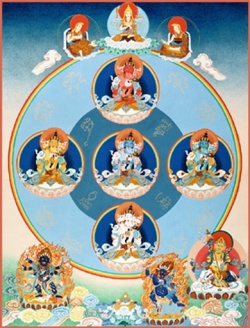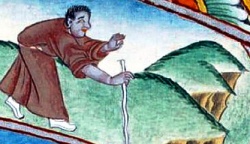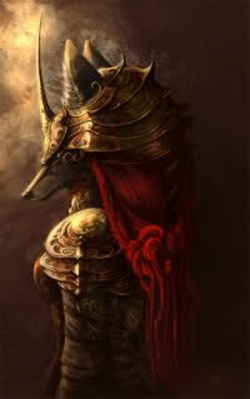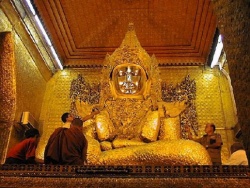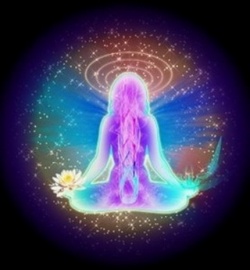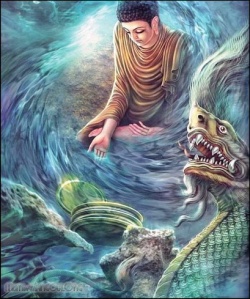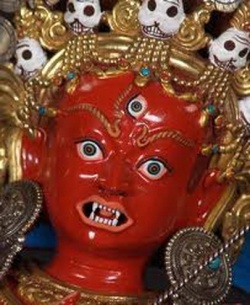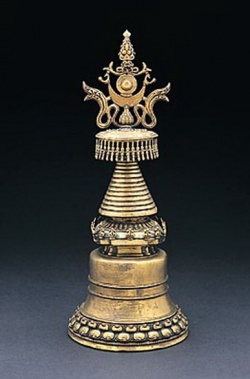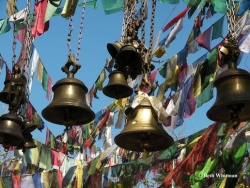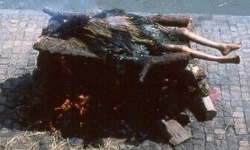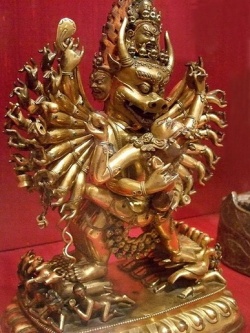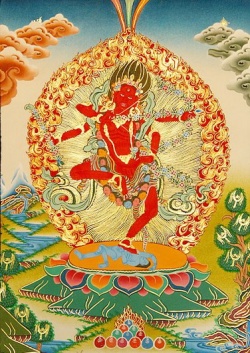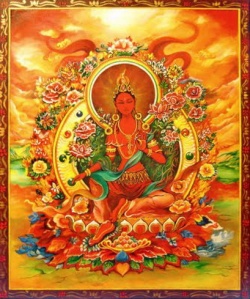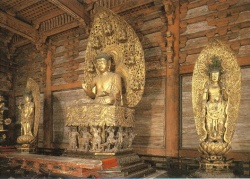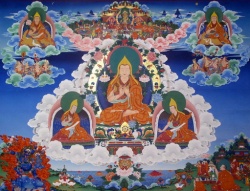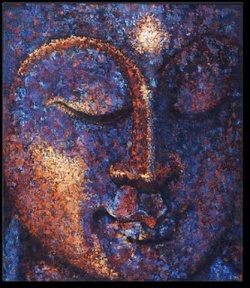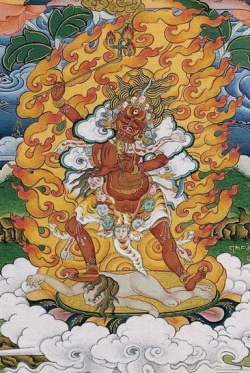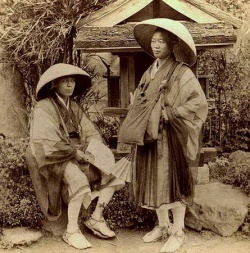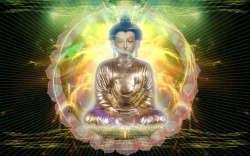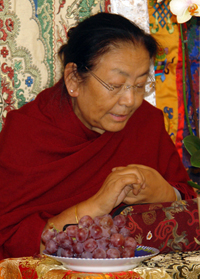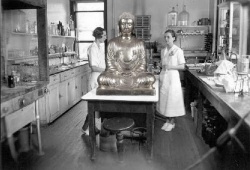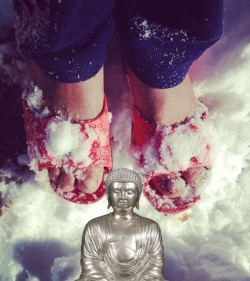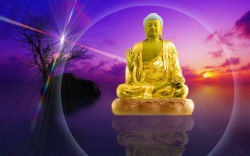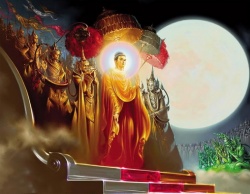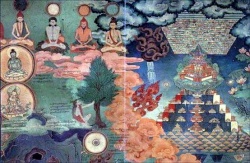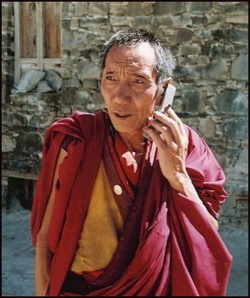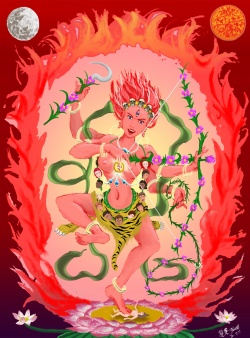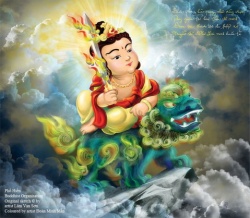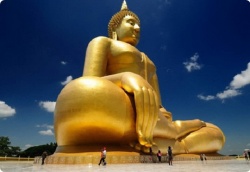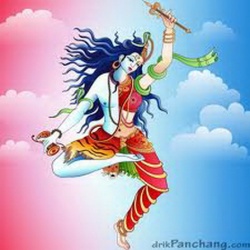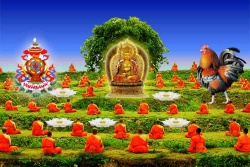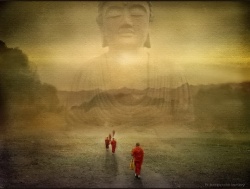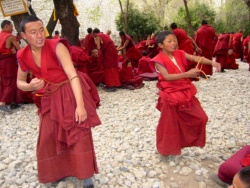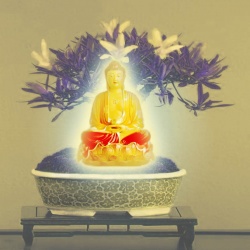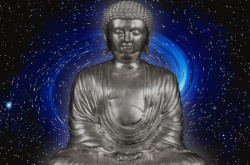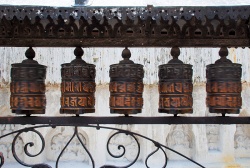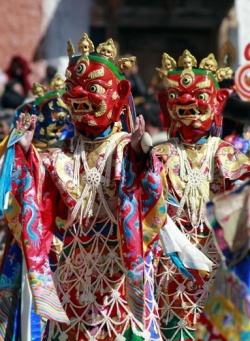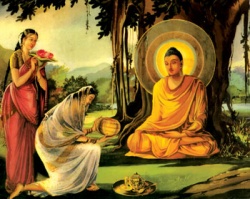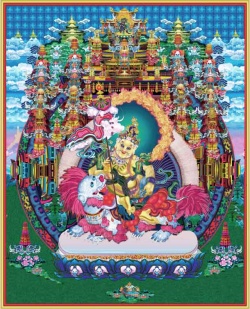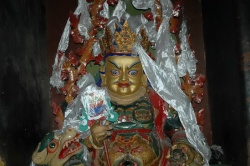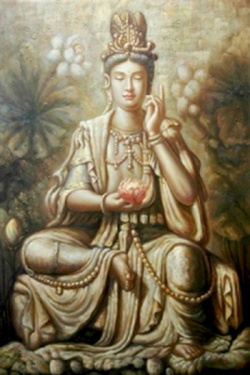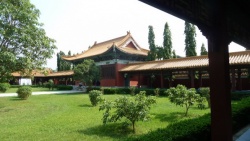Difference between revisions of "Tantra"
| (29 intermediate revisions by 2 users not shown) | |||
| Line 1: | Line 1: | ||
| − | [[File:FiveBuddhaFamilies.jpg|thumb|250px|]] | + | =Wikipedia= |
| + | |||
| + | |||
| + | |||
| + | |||
| + | |||
| + | |||
| + | [[File:FiveBuddhaFamilies.jpg|thumb|250px|]]{{DisplayImages|947|945|243|224|1547|508}} | ||
<poem> | <poem> | ||
| + | |||
| + | |||
'''[[Tantra]]''' (Tib [[gyüd]]) | '''[[Tantra]]''' (Tib [[gyüd]]) | ||
| − | (1) a [[ritual | + | |
| − | (2) a text associated with one or another of these [[traditions]]. There are also [[Hindu]] and [[Jain | + | |
| − | Important [[Buddhist | + | (1) a [[ritual tradition of the Vajrayana]], transmitted from [[guru]] to [[disciple]]; |
| + | |||
| + | |||
| + | (2) a text associated with one or another of these [[traditions]]. There are also [[Hindu]] and [[Jain tantras]]. | ||
| + | Important [[Buddhist Tantras]], mostly named after their [[principal]] [[deity]], include [[Guhyasamaja]], [[Cakrasamvara]], [[Hevajra]], [[Yamantaka]] and [[Kalacakra]]. | ||
| + | |||
The [[Tibetans]] differentiate between [[OLD TANTRAS]] (Tib. ''[[nyingma’i gyüd]]'') held to have been transmitted to [[Tibet]] at the [[time]] of [[Padmasambhava]] and mostly not [[existing]] in [[Sanskrit]], and [[NEW TANTRAS]] (Tib. ''[[sarmai gyüd]]'') which were transmitted in the 11th and 12th centuries and in many cases also [[exist]] in [[Sanskrit]] versions. | The [[Tibetans]] differentiate between [[OLD TANTRAS]] (Tib. ''[[nyingma’i gyüd]]'') held to have been transmitted to [[Tibet]] at the [[time]] of [[Padmasambhava]] and mostly not [[existing]] in [[Sanskrit]], and [[NEW TANTRAS]] (Tib. ''[[sarmai gyüd]]'') which were transmitted in the 11th and 12th centuries and in many cases also [[exist]] in [[Sanskrit]] versions. | ||
| + | |||
[[Tantra]] is the [[name]] [[scholars]] give to a style of [[religious]] [[ritual]] and [[Meditation]] that arose in {{Wiki|medieval}} [[India]] no later than the fifth century CE. The earliest documented use of the [[word]] [[Tantra]] is in the [[Hindu]] text, the {{Wiki|Rigveda}} (X.71.9). | [[Tantra]] is the [[name]] [[scholars]] give to a style of [[religious]] [[ritual]] and [[Meditation]] that arose in {{Wiki|medieval}} [[India]] no later than the fifth century CE. The earliest documented use of the [[word]] [[Tantra]] is in the [[Hindu]] text, the {{Wiki|Rigveda}} (X.71.9). | ||
| Line 12: | Line 27: | ||
[[Tantra]] has influenced the [[Hindu]], {{Wiki|Sikh}}, [[Bön]], [[Buddhist]], and [[Jain]] [[religious]] [[traditions]] and spread with [[Buddhism]] to {{Wiki|East Asia}} and {{Wiki|Southeast Asia}}. | [[Tantra]] has influenced the [[Hindu]], {{Wiki|Sikh}}, [[Bön]], [[Buddhist]], and [[Jain]] [[religious]] [[traditions]] and spread with [[Buddhism]] to {{Wiki|East Asia}} and {{Wiki|Southeast Asia}}. | ||
| − | Definitions | + | |
| + | |||
| + | '''Definitions''' | ||
| + | |||
| + | |||
| + | |||
| + | |||
There are a number of different definitions of [[Tantra]], not always mutually consistent. | There are a number of different definitions of [[Tantra]], not always mutually consistent. | ||
| − | |||
| − | |||
| − | |||
| − | The second [[traditional]] definition comes from the 10th century [[Tantric]] [[scholar]] Rāmakaṇṭha, who belonged to the [[dualist]] school called the [[Śaiva]] [[ | + | '''[[Traditional]] definitions''' |
| + | |||
| + | |||
| + | |||
| + | The [[Tantric tradition]] does offer two important definitions of what constitutes a [[tantra]] and why it is named such. The first comes from the Kāmikā-tantra: | ||
| + | |||
| + | |||
| + | Because it elaborates (tan) copious and profound matters, especially relating to the {{Wiki|principles}} of [[reality]] ([[tattva]]) and [[sacred]] [[mantras]], and because it provides [[liberation]] (tra), it is called a [[tantra]]. | ||
| + | |||
| + | The second [[traditional]] [[definition]] comes from the 10th century [[Tantric]] [[scholar]] [[Rāmakaṇṭha]], who belonged to the [[dualist]] school called the [[Śaiva Siddhānta]]: | ||
| + | |||
| + | |||
| + | A [[tantra]] is a divinely revealed [[Body]] of teachings, explaining what is necessary and what is a [[hindrance]] in the [[practice of the worship of God]] and also describing the specialized [[initiation]] and [[purification ceremonies]] that are the necessary prerequisites of [[Tantric practice]]. | ||
| + | |||
| + | |||
| + | [[Prabhat Ranjan Sarkar]] describes who a [[tantric]] is and what the [[tantric cult]] is: | ||
| + | |||
| + | |||
| + | A [[person]] who, irrespective of [[Caste]], [[Creed]] or [[religion]], aspires for [[spiritual]] expansion or does something concrete, is a [[Tantric]]. [[Tantra]] in itself is neither a [[religion]] nor an 'ism'. [[Tantra is a fundamental spiritual science]]. So wherever there is any [[spiritual practice]] it should be taken for granted that it stands on the [[Tantric cult]] | ||
| + | |||
| + | |||
| + | '''[[Scholastic definitions]]''' | ||
| − | |||
| − | |||
| − | + | {{Wiki|Modern}} [[scholars]] have also provided definitions of [[Tantra]]. [[David Gordon White]] of the {{Wiki|University of California}} offers the following: | |
| − | |||
| − | |||
[[File:KURUKULLAges.jpg|thumb|250px|]] | [[File:KURUKULLAges.jpg|thumb|250px|]] | ||
| − | + | ||
| + | |||
| + | [[Tantra]] is that {{Wiki|Asian}} [[Body]] of [[beliefs]] and practices which, working from the [[principle]] that the [[Universe]] we [[experience]] is [[nothing]] other than the concrete [[manifestation]] of the [[divine energy]] of the godhead that creates and maintains that [[Universe]], seeks to [[ritually]] appropriate and [[channel]] that [[energy]], within the [[human]] [[microcosm]], in creative and emancipatory ways. | ||
| + | |||
Anthony Tribe, a [[scholar]] of [[Buddhist Tantra]], offers a list of defining features:. | Anthony Tribe, a [[scholar]] of [[Buddhist Tantra]], offers a list of defining features:. | ||
| − | Centrality of | + | |
| − | Centrality of | + | |
| − | [[Visualisation]] and self-identification with | + | [[Centrality of ritual]], esp. {{Wiki|evocation}} and {{Wiki|worship}} of [[deities]]; |
| − | Necessity of | + | |
| − | Importance of the | + | [[Centrality of mantras]]; |
| − | [[ | + | |
| + | [[Visualisation]] and [[self-identification with deity]]; | ||
| + | |||
| + | [[Necessity of initiation]] / [[Esotericism]] / secrecy; | ||
| + | |||
| + | [[Importance of the teacher]] ([[Guru]], [[ācārya]]); | ||
| + | |||
| + | [[Ritua use of maṇḍalas]]; | ||
| + | |||
Transgressive/antinomian acts; | Transgressive/antinomian acts; | ||
| − | Revaluation of the | + | |
| + | [[Revaluation of the Body]]; | ||
| + | |||
Revaluation of the {{Wiki|status}} and role of women; | Revaluation of the {{Wiki|status}} and role of women; | ||
| − | |||
| − | |||
| − | [[Tantra]] as {{Wiki| | + | [[Analogical thinking]] [[[including]] microcosmic/macrocosmic correlation]; and |
| + | |||
| + | [[Revaluation of 'negative' mental states]] | ||
| + | |||
| + | |||
| + | |||
| + | ==='''[[Tantra as western construction]]'''=== | ||
| + | |||
| + | |||
| + | |||
| + | Robert Brown notes that the term [[tantrism]] is a construction of {{Wiki|western}} {{Wiki|scholarship}}, not a {{Wiki|concept}} that comes from the [[religious]] system itself. [[Tāntrikas]] ([[practitioners of Tantra]]) never attempted to define [[Tantra]] as a whole the way {{Wiki|Western}} [[scholars]] have. Rather, the [[Tantric]] [[dimension]] of each [[Wikipedia:South Asia|South Asian]] [[religion]] had its [[own]] [[name]]: | ||
| + | |||
| − | |||
| − | [[Tantric]] | + | [[Tantric Shaivism]] was known to its practitioners as the [[Mantramārga]], |
[[Tantric Buddhism]] has the indigenous [[name]] of the [[Vajrayana]], | [[Tantric Buddhism]] has the indigenous [[name]] of the [[Vajrayana]], | ||
| − | [[Tantric | + | [[Tantric Vaishnavism]] was known as the [[Pañcarātra]]. |
[[File:79.jpg|thumb|250px|]] | [[File:79.jpg|thumb|250px|]] | ||
| − | |||
| − | |||
| − | |||
| − | |||
| − | |||
| − | See also Late-Classical Age and [[Hinduism]] {{Wiki|Middle Ages}} | + | The general term "[[Tantra]]" may be used to denote all the teachings and practices found in the [[scriptures called tantras]] or [[āgamas]], a {{Wiki|synonym}}. It could equally be substituted by the {{Wiki|adjective}} Āgamic. |
| + | |||
| + | |||
| + | ===History=== | ||
| + | |||
| + | |||
| + | ===Golden Age of [[Hinduism]]=== | ||
| + | |||
| + | |||
| + | |||
| + | [[Tantrism]] originated in the early centuries CE and developed into a fully articulated [[tradition]] by the end of the [[Gupta period]]. This was the "[[Golden Age of Hinduism]]" (ca. 320–650 CE), which flourished during the [[Gupta Empire]] (320 to 550 CE) until the fall of the [[Harsha Empire]] (606 to 647 CE). During this period, [[Power]] was centralised, along with a growth of far distance trade, standardization of legal procedures, and general spread of literacy. [[Mahayana Buddhism]] flourished, but the {{Wiki|orthodox}} {{Wiki|Brahmana}} {{Wiki|culture}} began to be rejuvenated by the {{Wiki|patronage}} of the {{Wiki|Gupta Dynasty}}. The position of the [[Brahmans]] was reinforced, and the first {{Wiki|Hindu temples}} emerged during the late [[Gupta age]]. | ||
| + | |||
| + | |||
| + | |||
| + | ==Late-Classical [[Hinduism]]== | ||
| + | |||
| + | |||
| + | |||
| + | See also Late-Classical Age and [[Hinduism]] {{Wiki|Middle Ages}} | ||
| + | |||
| + | |||
| + | |||
| + | After the end of the [[Gupta Empire]] and the collapse of the [[Harsha Empire]], [[Power]] became decentralised in [[India]]. Several larger {{Wiki|kingdoms}} emerged, with "countless vasal states".The {{Wiki|kingdoms}} were ruled via a [[Wikipedia:Feudalism|feudal]] system. Smaller {{Wiki|kingdoms}} were dependent on the [[protection]] of the larger {{Wiki|kingdoms}}. "The great [[king]] was remote, was [[exalted]] and deified", as reflected in the [[Tantric]] [[Mandala]], which could also depict the [[king]] as the centre of the [[Mandala]]. | ||
| + | |||
| + | |||
| + | The {{Wiki|disintegration}} of central [[Power]] also lead to regionalisation of religiosity, and [[religious]] rivalry. Local {{Wiki|cults}} and [[languages]] were enhanced, and the influence of "[[Brahmanic ritualistic Hinduism]]" was diminished. Rural and devotional movements arose, along with {{Wiki|Shaivism}}, {{Wiki|Vaisnavism}}, [[Bhakti]] and [[Tantra]], though "{{Wiki|sectarian}} groupings were only at the beginning of their [[development]]". [[Religious]] movements had to compete for [[recognition]] by the local [[lords]]. [[Buddhism]] lost it's position, and began to disappear in [[India]]. | ||
| + | |||
| + | |||
| + | In the same period [[Vedanta]] changed, incorporating [[Buddhist]] [[thought]] and it's {{Wiki|emphasis}} on [[Consciousness]] and the working of the [[mind]]. [[Buddhism]], which was supported by the {{Wiki|ancient Indian}} urban {{Wiki|civilisation}} lost influence to the [[traditional]] [[religions]], which were rooted in the countryside. In {{Wiki|Bengal}}, [[Buddhism]] was even prosecuted. But at the same [[time]], [[Buddhism]] was incorporated into [[Hinduism]], when [[Gaudapada]] used [[Buddhist Philosophy]] to reinterpret the [[Upanishads]]. This also marked a shift from [[Atman]] and [[Brahman]] as a "living [[substance]]" to "[[maya-vada]]", where [[Atman]] and [[Brahman]] are seen as "[[pure]] [[Knowledge]]-[[Consciousness]]". According to Scheepers, it is this "[[maya-vada]]" [[view]] which has come to dominate [[Indian]] [[thought]]. | ||
| + | |||
| + | |||
| + | ===Spread of [[Tantra]]=== | ||
| − | |||
| − | |||
| − | |||
| − | |||
[[File:Buddhist bells.jpg|thumb|250px|]] | [[File:Buddhist bells.jpg|thumb|250px|]] | ||
| − | [[Tantric]] movements led to the formation of many [[esoteric]] | + | [[Tantric]] movements led to the formation of many [[esoteric schools]] of [[Hinduism]] and [[Buddhism]]. It has influenced the [[Hindu]], {{Wiki|Sikh}}, [[Bön]], [[Buddhist]], and [[Jain]] [[religious]] [[traditions]] and spread with [[Buddhism]] to {{Wiki|East Asia}} and {{Wiki|Southeast Asia}}. |
| + | |||
| + | |||
| + | |||
| + | |||
| + | ===Practices=== | ||
| − | |||
Rather than a single coherent system, [[Tantra]] is an [[accumulation]] of practices and [[ideas]]. Because of the wide range of communities covered by the term [[tantra]], it is challenging and problematic to describe [[tantric]] practices definitively. | Rather than a single coherent system, [[Tantra]] is an [[accumulation]] of practices and [[ideas]]. Because of the wide range of communities covered by the term [[tantra]], it is challenging and problematic to describe [[tantric]] practices definitively. | ||
| − | |||
| − | |||
| − | The [[Tantric]] [[practitioner]] seeks to use [[prana]], an [[energy]] that flows through the [[Universe]] (including one's own [[Body]]) to attain goals that may be [[spiritual]], material or both. | + | [[Goal of Tantra]] |
| + | |||
| + | |||
| + | [[Tantric ritual]] seeks to access the [[supra-mundane]] through the [[mundane]], identifying the [[microcosm]] with the [[macrocosm]]. The [[Tantric]] [[aim]] is to sublimate rather than to negate [[relative]] [[reality]]. | ||
| + | |||
| + | The [[Tantric practitioner]] seeks to use [[prana]], an [[energy]] that flows through the [[Universe]] ([[including]] one's [[own]] [[Body]]) to attain goals that may be [[spiritual]], material or both. | ||
| + | |||
| + | |||
The [[Tantric Path]] | The [[Tantric Path]] | ||
| − | |||
| − | Various techniques are used as aids for [[Meditation]] and for the [[achievement]] of [[spiritual]] and [[magical]] [[Power]]: | + | Long {{Wiki|training}} is generally required to [[master]] [[Tantric]] [[methods]], into which pupils are typically [[initiated]] by a [[Guru]]. |
| + | |||
| + | Various [[techniques]] are used as aids for [[Meditation]] and for the [[achievement]] of [[spiritual]] and [[magical]] [[Power]]: | ||
| + | |||
| + | |||
| + | |||
| + | [[Yoga]], [[including]] {{Wiki|breathing}} [[techniques]] and [[postures]] ([[asana]]), is employed to [[subject]] the [[Body]] to the control of the will; | ||
| − | |||
[[Mudras]], or gestures; | [[Mudras]], or gestures; | ||
| − | [[Mantras]] or syllables, words and phrases; | + | |
| + | [[Mantras]] or {{Wiki|syllables}}, [[words and phrases]]; | ||
| + | |||
[[Mandalas]]; | [[Mandalas]]; | ||
| + | |||
[[Yantras]], [[symbolic]] diagrams of the forces at work in the [[Universe]]; | [[Yantras]], [[symbolic]] diagrams of the forces at work in the [[Universe]]; | ||
| + | |||
Identification with [[deities]]. (See [[Anuttarayoga Tantra]] for [[Tibetan Buddhist]] [[ideas]].) | Identification with [[deities]]. (See [[Anuttarayoga Tantra]] for [[Tibetan Buddhist]] [[ideas]].) | ||
| + | |||
The process of sublimation consists of three phases: | The process of sublimation consists of three phases: | ||
| + | |||
| + | |||
[[File:Cremation.jpg|thumb|250px|]] | [[File:Cremation.jpg|thumb|250px|]] | ||
| + | |||
| + | |||
[[Purification]] | [[Purification]] | ||
| + | |||
| + | |||
Elevation | Elevation | ||
| − | |||
| − | Classifications of practices | + | "Reaffirmation of [[Wikipedia:Identity (social science)|identity]] on the plane of [[pure Consciousness]]" |
| − | Statue of the [[Tantric | + | |
| + | |||
| + | ===[[Classifications of practices]]=== | ||
| + | |||
| + | |||
| + | |||
| + | Statue of the [[Tantric goddess]] [[Kali]] from Dakshineswar, {{Wiki|West Bengal}}, [[India]]; along with her [[Yantra]]. | ||
| + | |||
| + | |||
| + | {{Wiki|Avalon}} provides a {{Wiki|dichotomy}} of the "[[Ordinary Ritual]]" and the "[[Secret Ritual]]". | ||
| + | |||
| + | The [[methods]] employed by [[Dakshinachara]] ([[right-handpath]]) interpretations of [[Tantra]] are very different from the [[methods]] used in the pursuit of the [[Vamachara]] ([[left-hand path]]). | ||
| + | |||
| + | |||
| + | [[Mantra]], [[yantra]], [[nyasa]] | ||
| + | |||
| + | |||
| + | |||
| + | Linguistically the three words [[mantram]], [[tantram]] and [[yantram]] are related in the {{Wiki|ancient}} [[traditions]] of [[India]], as well as phonologically. [[Mantram]] denotes the [[chant]], or "[[Knowledge]]." | ||
| + | |||
| + | [[Tantram]] denotes [[philosophy]], or [[ritual]] [[actions]]. [[Yantram]] denotes the means by which a [[human]] is expected to lead his [[Life]]. | ||
| + | |||
| − | + | The [[Mantra]] and [[yantra]] are instruments to invoke specific [[Hindu]] [[deities]] such as [[Shiva]], [[Shakti]], or [[Kali]]. | |
| − | + | Similarly, [[puja]] may involve focusing on a [[yantra]] or [[Mandala]] associated with a [[deity]]. | |
| − | [[ | ||
| − | |||
| − | + | Each [[Mantra]] is associated with a specific [[Nyasa]]. [[Nyasa]] involves {{Wiki|touching}} various parts of the [[Body]] with specific portions of the [[Mantra]]. This is considered to be invoking presence of the [[deity]] of the [[Mantra]] inside the [[Body]]. | |
| + | |||
| + | There are various types of [[Nyasas]] - The most important of them being [[Kara Nyasa]] and [[Anga Nyasa]]. | ||
| + | |||
| + | |||
| + | [[Identification with deities]] | ||
| + | |||
| + | |||
| + | |||
| + | [[Tantra]], as a [[development]] of early Hindu-Vedic [[thought]], embraced the [[Hindu]] [[gods]] and [[goddesses]], especially [[Shiva]] and [[Shakti]], along with the [[Advaita]] [[philosophy]] that each represents an aspect of the [[Wikipedia:Absolute (philosophy)|ultimate]] [[Para Brahman]], or [[Adi Parashakti]]. | ||
| + | |||
| + | |||
| + | These [[deities]] may be [[worshipped]] externally with [[Flowers]], [[Incense]], and other [[offerings]], such as singing and [[Dancing]]. These [[Tantric practices]] [[Form]] the foundation of the [[ritual]] [[temple]] [[dance]] of the [[devadasis]], and are preserved in the Melattur style of Bharatanatyam by [[Guru]] Mangudi Dorairaja [[Iyer]]. | ||
| − | |||
| − | |||
| − | |||
| − | |||
[[Visualisation]] | [[Visualisation]] | ||
| + | |||
| + | |||
[[File:La Vajrabhairava.jpg|thumb|250px|]] | [[File:La Vajrabhairava.jpg|thumb|250px|]] | ||
| − | These [[deities]] are engaged internally as [[attributes]] of [[Ishta Devata]] [[meditations]], the practitioners either [[visualizing]] themselves as the [[deity]], or experiencing the [[darshan]] (the [[vision]]) of the [[ | + | These [[deities]] are engaged internally as [[attributes]] of [[Ishta Devata]] [[meditations]], the practitioners either [[visualizing]] themselves as the [[deity]], or experiencing the [[darshan]] (the [[vision of the [[deity]]. |
| + | |||
| + | |||
| + | During [[Meditation]] the [[initiate]] identifies with any of the numerous [[Hindu]] [[gods]] and [[goddesses]], [[visualizes]] them and internalises them, a process likened to {{Wiki|sexual}} courtship and consummation. | ||
| + | |||
| + | The [[Tantrika]] [[practitioner]] may use [[visualizations]] of [[deities]], identifying with the [[deity]] so that the aspirant "becomes" the Ishta-[[Deva]] or [[meditational deity]]. | ||
| + | |||
| + | |||
| + | [[Three classes devotees]] | ||
| + | |||
| + | In [[Hindu Tantra]] practices when bringing together the [[deity]] and the [[devotee]], they use both [[Meditation]] and [[ritual practices]]. These practices are divided into [[three classes]] of {{Wiki|devotees}}: | ||
| + | |||
| + | |||
| + | the [[animal]], | ||
| + | |||
| + | heroic, | ||
| + | |||
| + | and the [[divine]]. | ||
| + | |||
| + | In the [[divine devotee]], the [[rituals]] are internal. The [[divine devotee]] is the only one that can attain the [[object]] of the [[rituals]], which are directed to [[Awakening]] [[kundalini]] [[energy]]. | ||
| + | |||
| + | |||
| + | |||
| + | ==[[Vamamarga]] - [[Secret ritual]]== | ||
| + | |||
| + | |||
| + | |||
| + | [[Secret ritual]] may include any or all of the [[elements]] of [[ordinary ritual]], either directly or substituted, along with other sensate [[rites]] and themes such as a feast (representing [[Food]], or [[sustenance]]), coitus (representing {{Wiki|sexuality}} and procreation), the [[charnel grounds]] ([[representing Death]] and transition) and defecation, urination and vomiting (representing waste, renewal, and fecundity). It is this sensate inclusion that prompted Zimmer's praise of [[Tantra's]] [[World]]-[[affirming]] [[attitude]]: | ||
| + | |||
| + | |||
| + | |||
| + | In the [[Tantra]], the [[manner]] of approach is not that of Nay but of Yea ... the [[World]] [[attitude]] is affirmative ... Man must approach through and by means of [[nature]], not by rejection of [[nature]]. | ||
| + | |||
| − | + | [[Arthur Avalon]] states that the [[Panchatattva Chakrapuja]] and [[Panchamakara]] involve: | |
| − | [[ | ||
| − | + | ||
| − | |||
| − | + | {{Wiki|Worship}} with the [[Pañcatattva]] generally takes place in a [[Cakra]] or circle composed of men and women... sitting in a circle, the [[Shakti]] (or {{Wiki|female}} [[practitioner]]) being on the [[Sadhaka's]] ({{Wiki|male}} practitioner's) left. Hence it is called [[Cakrapuja]]. ...There are various kinds of [[Cakra]] – {{Wiki|productive}}, it is said, of differing {{Wiki|fruits}} for the participator therein. | |
| − | + | {{Wiki|Avalon}} also provides a series of variations and substitutions of the [[Panchatattva]] ([[Panchamakara]]) "[[elements]]" or [[tattva]] encoded in the [[Tantras]] and various [[tantric]] [[traditions]], and affirms that there is a direct correlation to the [[Tantric]] Five Nectars and the [[Mahābhūta]]. | |
| − | |||
| − | |||
| − | + | ===[[Sexual rites]]=== | |
| − | + | ||
| − | This section needs additional citations for verification. Please help improve this article by adding citations to reliable sources. Unsourced material may be challenged and removed. (April 2011) | + | |
| + | |||
| + | This section needs additional citations for verification. Please help improve this article by adding citations to reliable sources. Unsourced material may be challenged and removed. (April 2011) | ||
| + | |||
[[File:KURUKULLA0lg.jpg|thumb|250px|]] | [[File:KURUKULLA0lg.jpg|thumb|250px|]] | ||
| − | Although popularly equated with [[Tantra]] in its entirety in the [[West]], such | + | Although popularly equated with [[Tantra]] in its entirety in the [[West]], such [[sexual rites]] were historically practiced by a minority of sects. For many practicing [[lineages]], these [[maithuna]] practices progressed into [[psychological]] [[symbolism]]. |
| + | |||
| + | |||
Origins | Origins | ||
| − | |||
| − | {{Wiki| | + | According to White, [[sexual rites]] of [[Vamamarga]] may have emerged from early [[Hindu Tantra]] as a {{Wiki|practical}} means of catalyzing biochemical transformations in the [[Body]] to facilitate heightened states of [[awareness]]. These constitute a [[vital offering]] to [[Tantric deities]]. |
| + | |||
| + | |||
| + | [[Sexual rites]] may have also evolved from {{Wiki|clan}} [[initiation ceremonies]] involving transactions of {{Wiki|sexual}} fluids. | ||
| + | |||
| + | Here the {{Wiki|female}} [[initiate]] is inseminated or ensanguined with the {{Wiki|sexual}} emissions of the {{Wiki|male}} [[consort]], sometimes admixed with the semen of the [[Guru]]. | ||
| + | |||
| + | The [[Tantrika]] is thus [[transformed]] into a son of the {{Wiki|clan}} ([[kulaputra]]) through the grace of his [[consort]]. The {{Wiki|clan}} fluid ([[kuladravya]]) or {{Wiki|clan}} [[nectar]] ([[kulamrita]]) is [[conceived]] as flowing naturally from her [[womb]]. | ||
| + | |||
| + | |||
| + | |||
[[Religious]] aims | [[Religious]] aims | ||
| − | |||
| − | |||
| − | + | Later developments in the [[rite]] {{Wiki|emphasize}} the primacy of [[bliss]] and [[divine]] union, which replace the more [[bodily]] connotations of earlier [[forms]]. | |
| + | |||
| + | |||
| + | When enacted as enjoined by the [[Tantras]], the [[ritual]] culminates in a [[sublime]] [[experience]] of [[infinite awareness]] for both participants. [[Tantric texts]] specify that {{Wiki|sex}} has three {{Wiki|distinct}} and separate purposes—procreation, [[pleasure]], and [[liberation]]. Those seeking [[liberation]] eschew frictional {{Wiki|orgasm}} for a higher [[Form of ecstasy]]. Several [[sexual rituals]] are recommended and practiced. These involve elaborate and meticulous preparatory and [[purificatory rites]]. | ||
| + | |||
| − | Tantrics understand these acts on multiple levels. The {{Wiki|male}} and {{Wiki|female}} participants are conjoined {{Wiki|physically}}, and represent [[Shiva]] and [[Shakti]], the {{Wiki|male}} and {{Wiki|female}} {{Wiki|principles}}. [[Beyond]] the [[physical]], a {{Wiki|subtle}} fusion of [[Shiva]] and [[Shakti]] energies takes place, resulting in a united [[energy]] field. On an {{Wiki|individual}} level, each participant [[experiences]] a fusion of one's own [[Shiva]] and [[Shakti]] energies. | + | The {{Wiki|sexual}} act itself balances energies coursing within the [[pranic]] ida and [[pingala]] [[channels]] in the [[subtle bodies]] of both participants. The [[sushumna nadi]] is [[awakened]] and [[kundalini]] rises upwards within it. This eventually culminates in [[Samadhi]], wherein the respective {{Wiki|individual}} personalities and {{Wiki|identities}} of each of the participants are completely dissolved in a {{Wiki|unity}} of [[cosmic Consciousness]]. |
| + | |||
| + | |||
| + | [[Tantrics]] understand these acts on multiple levels. The {{Wiki|male}} and {{Wiki|female}} participants are conjoined {{Wiki|physically}}, and represent [[Shiva]] and [[Shakti]], the {{Wiki|male}} and {{Wiki|female}} {{Wiki|principles}}. [[Beyond]] the [[physical]], a {{Wiki|subtle}} fusion of [[Shiva]] and [[Shakti]] energies takes place, resulting in a united [[energy]] field. On an {{Wiki|individual}} level, each participant [[experiences]] a fusion of one's [[own]] [[Shiva]] and [[Shakti]] energies. | ||
[[File:Kurukulla-1.jpg|thumb|250px|]] | [[File:Kurukulla-1.jpg|thumb|250px|]] | ||
| − | |||
| − | |||
| − | |||
| − | [[Tantra]], especially in its [[nondual]] [[forms]], rejected the renunciant values of | + | ===[[Doctrines]]=== |
| − | The [[World]] is {{Wiki| | + | |
| + | |||
| + | |||
| + | Defined primarily as a technique-rich style of [[spiritual]] practice, [[Tantra]] has no single coherent [[Doctrine]]. It developed different teachings in [[connection]] with the different [[religions]] that adopted the [[Tantric method]]. These teachings tended to support and validate the practices of [[Tantra]]. | ||
| + | |||
| + | These practices, in their classical [[Form]], are more oriented to the [[married]] [[Householder]] than the [[monastic]] or {{Wiki|solitary}} renunciant. They exhibited what may be called a [[World]]-embracing rather than a [[World]]-denying [[character]]. | ||
| + | |||
| + | [[Tantra]], especially in its [[nondual]] [[forms]], rejected the renunciant values of [[Patañjalian yoga]], [[offering]] instead a [[vision]] of the whole of [[reality]] as the self-expression of a single, free and [[blissful]] [[Divine Consciousness]] under whatever [[name]], whether [[Śiva]] or [[Buddha-nature]]. | ||
| + | |||
| + | |||
| + | |||
| + | ===The [[World is real]]=== | ||
| + | |||
| + | |||
| + | |||
| + | Since the [[World]] was viewed as {{Wiki|real}}, not [[illusory]], this [[Doctrine]] was a significant innovation over and against previous [[Indian]] [[philosophies]], which tended to picture the [[Divine]] as absolutely [[transcendent]] and/or the [[World as Illusion]]. The {{Wiki|practical}} consequence of this [[view]] was that not only could householders aspire to [[spiritual liberation]] in the [[Tantric]] system, they were the type of [[practitioner]] that most [[Tantric]] manuals had in [[mind]]. | ||
| + | |||
| + | Furthermore, since [[Tantra]] dissolved the {{Wiki|dichotomy}} of [[spiritual]] versus [[mundane]], practitioners could entail every aspect of their daily [[lives]] into their [[spiritual]] growth process, seeking to realize the [[divine]] that is both [[transcendent]] and immanent. [[Tantric spiritual practices]] and [[rituals]] thus [[aim]] to bring about an inner [[realization]] of the [[Truth]] that "[[Nothing exists that is not Divine]]" ([[nāśivaṃ vidyate kvacit]]), bringing freedom from [[Ignorance]] and from the cycle of [[Suffering]] ([[Saṃsāra]]) in the process. | ||
| + | |||
| + | In fact, [[tantric visualizations]] are said to bring the [[meditator]] to the core of his [[humanity]] and [[oneness]] with {{Wiki|transcendence}}. [[Tantric]] [[meditations]] do not serve the [[function]] of {{Wiki|training}} or practicing extra [[beliefs]] or unnatural ways. On the contrary, the {{Wiki|transcendence}} that is reached by such [[meditative]] work does not construct anything in the [[mind]] of the [[practitioner]], but actually deconstructs all pre-conceived notions of the [[human]] [[condition]]. | ||
| − | + | The barriers that constrict [[thinking]] to limitation-namely, {{Wiki|cultural}} and {{Wiki|linguistic}} frameworks-are completely removed. This allows the [[person]] to [[experience]] total [[liberation]] and then {{Wiki|unity}} with [[Wikipedia:Absolute (philosophy)|ultimate]] [[Truth]] or [[reality]]. | |
| − | |||
| − | |||
[[Evolution]] and involution | [[Evolution]] and involution | ||
| + | |||
| + | |||
[[File:M-bud10.jpg|thumb|250px|]] | [[File:M-bud10.jpg|thumb|250px|]] | ||
| − | According to [[Tantra]], "being- | + | According to [[Tantra]], "[[being-Consciousness-bliss]]" or [[Satchidananda]] has the [[Power] of both self-Evolution and self-involution]]. {{Wiki|Prakriti}} or "[[reality]]" evolves into a multiplicity of creatures and things, yet at the same [[time]] always remains [[pure Consciousness]], [[pure]] being, and [[pure bliss]]. In this process of [[Evolution]], [[Maya]] ([[Illusion]]) veils [[Reality]] and separates it into opposites, such as [[conscious]] and [[Unconscious]], [[pleasant]] and [[unpleasant]], and so forth. If not [[recognized]] as [[Illusion]], these opposing determining [[conditions]] bind, limit and [[Fetter]] ([[pashu]]) the {{Wiki|individual}} ([[jiva]]). |
| + | |||
| + | Generally {{Wiki|speaking}}, the [[Hindu]] [[God]] and [[goddess]] [[Shiva]] and [[Shakti]] are [[perceived]] as separate and {{Wiki|distinct}}. However, in [[Tantra]], even in the process of [[Evolution]], [[Reality]] remains [[pure Consciousness]], [[pure being]] and [[pure bliss]], and [[Tantra]] denies neither the act nor the fact of this process. In fact, [[Tantra]] affirms that both the [[World]]-process itself, and the {{Wiki|individual}} [[jiva]], are themselves {{Wiki|Real}}. In this [[respect]], [[Tantra]] distinguishes itself both from [[pure]] [[dualism]] and from the qualified [[non-dualism]] of [[Vedanta]]. | ||
| + | |||
| − | + | [[Evolution]], or the "outgoing current," is only half of the functioning of [[Maya]]. Involution, or the "return current," takes the [[jiva]] back towards the source, or the [[root of Reality]], revealing the [[infinite]]. [[Tantra]] is understood to teach the method of changing the "outgoing current" into the "return current," [[transforming]] the [[Fetters]] created by [[Maya]] into that which "releases" or "{{Wiki|liberates}}." This [[view]] underscores two maxims of [[Tantra]]: "One must rise by that by which one falls," and "the very [[poison]] that kills becomes the elixir of [[Life]] when used by the [[wise]]." | |
| − | |||
| − | |||
| − | + | ===[[Scripture]]=== | |
| − | |||
| − | The historical significance of the [[Tantric]] method lies in the fact that it impacted every major [[Indian]] [[religion]] extant in the early {{Wiki|medieval}} period (c. 500 – 1200 CE): thus the [[Hindu]] sects of {{Wiki|Shaivism}}, [[Shaktism]] and [[Vaishnavism]], as well as [[Buddhism]] and [[Jainism]] all developed a well-documented [[Body | + | |
| − | + | The [[primary]] sources of written [[Hindu Tantric]] lore are the [[agama]], which generally consist of [[four parts]]: | |
| + | |||
| + | [[delineating metaphysical Knowledge]] ([[jnana]]), | ||
| + | |||
| + | {{Wiki|contemplative}} procedures ([[yoga]]), | ||
| + | |||
| + | [[ritual]] regulations ([[kriya]]), | ||
| + | |||
| + | and [[ethical]] and [[religious]] injunctions ([[charya]]). | ||
| + | |||
| + | |||
| + | Schools and [[lineages]] affiliate themselves with specific [[agamic]] [[traditions]]. [[Hindu]] [[tantra]] | ||
| + | |||
| + | [[exists]] in [[Shaiva]], [[Vaisnava]], [[Ganapatya]], [[Saura]] and [[Shakta]] [[forms]], amongst others, so that {{Wiki|individual}} [[tantric texts]] may be classified as [[Shaiva]] [[Āgamas]], [[Vaishnava]] [[Pāñcarātra]] [[Saṃhitās]], and [[Shakta]] [[Tantras]], though there is no clear dividing line between these works. The expression [[Tantra]] generally includes all such works. | ||
| + | |||
| + | |||
| + | [[Influence on Asian religions]] | ||
| + | |||
| + | |||
| + | The historical significance of the [[Tantric]] method lies in the fact that it impacted every major [[Indian]] [[religion]] extant in the early {{Wiki|medieval}} period (c. 500 – 1200 CE): thus the [[Hindu]] sects of {{Wiki|Shaivism}}, [[Shaktism]] and [[Vaishnavism]], as well as [[Buddhism]] and [[Jainism]] all developed a well-documented [[Body of Tantric practices]] and related [[doctrines]]. Even {{Wiki|Islam}} in [[India]] was influenced by [[Tantra]]. | ||
| + | |||
| + | |||
| + | [[Tantric ideas]] and practices spread far outside of [[India]], into [[Tibet]], [[Nepal]], [[China]], [[Japan]], [[Cambodia]], [[Vietnam]], and {{Wiki|Indonesia}}. Today, it is [[Tibetan Buddhism]] and various [[forms]] of [[Hinduism]] that show the strongest [[Tantric influence]], as well as the international postural [[yoga]] {{Wiki|movement}} and most [[forms]] of [[American]] alternative [[spirituality]] grouped under the {{Wiki|New Age}} rubric. | ||
| + | |||
| + | |||
| + | |||
| + | [[Vedic tradition]] | ||
[[File:Jse.jpg|thumb|250px|]] | [[File:Jse.jpg|thumb|250px|]] | ||
| − | |||
| − | However, it has been claimed that {{Wiki|orthodox}} {{Wiki|Vedic}} [[traditions]] were antagonistic to [[Tantra]]. André Padoux notes that in [[India | + | Various {{Wiki|orthodox}} [[Brahmanas]] routinely incorporate [[Tantric]] [[rituals]] in their daily [[activities]] (Ahnikas). For example, [[sarvA~nga-nyasas and kara-nyAsas ([[Tantric techniques]] for placing various [[deities]]) are part of [[Chanting]] tracts such as the [[rudra-prashna]] of the [[yajur veda]] and [[Vishnu-sahasra-nama]]; and [[Gayatri-Avahanam]] is a common part of [[Sandhyavandanam]] in [[south]] [[India]]. {{Wiki|Orthodox}} [[temple]] archakas of various sects profess to follow {{Wiki|rules}} laid out in [[Tantric texts]], for example {{Wiki|priests}} of the Iyengar [[sect]] prefer to follow [[Pañcaratra Agamas]]. |
| − | [[Shaiva]] [[ | + | |
| + | |||
| + | However, it has been claimed that {{Wiki|orthodox}} {{Wiki|Vedic}} [[traditions]] were [[antagonistic]] to [[Tantra]]. André Padoux notes that in [[India tantra]] is marked by a rejection of {{Wiki|orthodox}} {{Wiki|Vedic}} {{Wiki|tenets}}. Moriz Winternitz, in his review of the {{Wiki|literature}} of [[tantra]], points out that, while [[Indian tantric texts]] are not positively {{Wiki|hostile}} to the [[Vedas]], they may regard The [[Precepts]] of the [[Vedas]] as too difficult for our age, while an easier {{Wiki|cult}} and an easier [[Doctrine]] have been revealed in them. Many {{Wiki|orthodox}} | ||
| + | |||
| + | [[Brahmans]] who accept the authority of the [[Vedas]] reject the authority of the [[Tantras]]. Although later [[Tantric]] writers wanted to base their [[doctrines]] on the [[Vedas]], some {{Wiki|orthodox}} followers of the {{Wiki|Vedic}} [[tradition]] invariably referred to [[Tantra]] in a [[spirit]] of [[denunciation]], stressing its anti-Vedic [[character]]. | ||
| + | |||
| + | |||
| + | [[Shaiva Tantra]] | ||
| + | |||
| + | |||
| + | The [[tantric Shaiva]] [[tradition]] consists of the [[Kapalikas]], [[Kashmir]] {{Wiki|Shaivism}} and [[Shaiva Siddhanta]]. | ||
| + | |||
| + | |||
| + | The [[word]] "[[Tāntrika]]" is used for followers of the [[Tantras]] in {{Wiki|Shaivism}}. | ||
| − | |||
| − | |||
| − | |||
| + | ===[[Yoga]]=== | ||
| + | |||
| + | |||
| + | |||
| + | [[Shaiva tantra]] gave us the {{Wiki|Hatha Yoga}} manuals, such as the 15th century [[Wikipedia:Hatha yoga|Hathayoga]] [[Pradīpikā]] and the 16th century [[Gheranda Samhitā]]. It is from these manuals that most {{Wiki|modern}} [[Knowledge]] of [[Yoga]] and the [[subtle Body]] derives. | ||
| + | |||
| + | |||
| + | [[Yoga]] as it has been inherited in the {{Wiki|modern}} [[World]] has its [[roots]] in [[Tantric ritual]] and in secondary passages ([[pādas]]) within [[Tantric scriptures]]. The practices of [[Mantra]], [[āsana]] (seat/pose), sense-withdrawal ([[pratyāhāra]]), [[Breath]]-regulation ([[prānāyāma]]), [[mental]] ([[mantric]]) fixation ([[dhāranā]]), [[Meditation]] ([[Dhyāna]]), [[mudrā]], the [[subtle Body]] ([[sukshma shārīra]]) with its [[energy]] | ||
| + | |||
| + | centers ([[chakras]], [[ādhāras]], granthis, etc.) and [[channels]] ([[nādīs]]), as well as the [[phenomenon]] of [[Kundalinī Shakti]] are but a few of the {{Wiki|tenets}} that comprise [[Tantric Yoga]]. While some of these derive from earlier, pre-Tantric sources, such as the [[Hindu]] [[Upanishads]] and the [[Yoga Sūtra]], they were greatly expanded upon, {{Wiki|ritualized}}, and {{Wiki|philosophically}} contextualized in these {{Wiki|medieval}} [[Tantras]]. | ||
| − | |||
| − | |||
[[File:Joyofbeing.jpg|thumb|250px|]] | [[File:Joyofbeing.jpg|thumb|250px|]] | ||
| − | Fernando Estévez Griego, describing the Gheranda Samhita as being a [[tantric]] | + | Fernando Estévez Griego, describing the [[Gheranda Samhita]] as being a [[tantric text]], says that [[Raja Yoga]] means "[[Samadhi]]" from the [[tantric]] point of [[view]]. |
| − | [[Buddhist Tantra]] | + | |
| + | |||
| + | |||
| + | ===[[Buddhist Tantra]]=== | ||
[[Vajrayana]] comprises the [[scriptures]] and [[lineages]] founded by the [[Indian]] [[Mahasiddhas]]. | [[Vajrayana]] comprises the [[scriptures]] and [[lineages]] founded by the [[Indian]] [[Mahasiddhas]]. | ||
| − | |||
| − | ...each one of us is a union of all [[universal]] [[energy]]. Everything that we need in order to be complete is within us right at this very moment. It is simply a [[matter]] of being able to [[recognize]] it. This is the [[tantric]] approach. | + | According to [[Tibetan Buddhist]] [[Tantric master]] [[Lama]] [[Thubten Yeshe]]: |
| + | |||
| + | ...each one of us is a union of all [[universal]] [[energy]]. Everything that we need in order to be complete is within us right at this very [[moment]]. It is simply a [[matter]] of being able to [[recognize]] it. This is the [[tantric]] approach. | ||
| + | |||
| + | |||
| + | |||
| + | |||
| + | ==={{Wiki|Western}} [[views]]=== | ||
| + | |||
| − | |||
| − | |||
| + | The [[Sri Yantra]] (shown here in the three-dimensional projection known as Sri [[Meru]] or [[Maha Meru]] used mainly in [[rituals]] of the [[Srividya Shakta]] sects) is central to most [[Tantric forms]] of [[Shaktism]]. | ||
| − | |||
| − | |||
| − | Following Sir John Woodroffe, a number of [[scholars]] began to actively investigate [[Tantric teachings]]. These included a number of [[scholars]] of comparative [[religion]] and {{Wiki|Indology}}, such as: Agehananda Bharati, {{Wiki|Mircea Eliade}}, {{Wiki|Julius Evola}}, {{Wiki|Carl Jung}}, {{Wiki|Giuseppe Tucci}} and Heinrich Zimmer. | + | The first {{Wiki|Western}} [[scholar]] to take the study of [[Tantra]] seriously was [[Sir John Woodroffe]] (1865–1936), who wrote about [[Tantra]] under the pen [[name]] [[Arthur Avalon]]. He is generally held as the "[[founding father of Tantric studies]]." Unlike previous {{Wiki|Western}} [[scholars]], [[Woodroffe]] was an ardent advocate for [[Tantra]], defending [[Tantra]] against its many critics and presenting [[Tantra]] as an |
| + | |||
| + | [[ethical]] [[philosophical]] system greatly in accord with the [[Vedas]] and [[Vedanta]]. [[Woodroffe]] himself practiced [[Tantra]] as he saw and understood it and, while trying to maintain his {{Wiki|scholastic}} objectivity, was considered a [[student]] of [[Hindu Tantra]] (in particular [[Shiva-Shakta]]) [[tradition]]. | ||
| + | |||
| + | |||
| + | |||
| + | ===Further [[development]]=== | ||
| + | |||
| + | |||
| + | Following [[Sir John Woodroffe]], a number of [[scholars]] began to actively investigate [[Tantric teachings]]. These included a number of [[scholars]] of comparative [[religion]] and {{Wiki|Indology}}, such as: [[Agehananda Bharati]], {{Wiki|Mircea Eliade}}, {{Wiki|Julius Evola}}, {{Wiki|Carl Jung}}, {{Wiki|Giuseppe Tucci}} and [[Heinrich Zimmer]]. | ||
| + | |||
| + | |||
| + | According to Hugh Urban, Zimmer, Evola and [[Wikipedia:Mircea Eliade|Eliade]] viewed [[Tantra]] as "the culmination of all [[Indian]] [[thought]]: the most [[radical]] [[Form of spirituality]] and the {{Wiki|archaic}} [[Heart]] of aboriginal [[India]]", and regarded it as the {{Wiki|ideal}} [[religion]] of the {{Wiki|modern}} {{Wiki|era}}. All three saw [[Tantra]] as "the most transgressive and [[violent path]] to the [[sacred]]." | ||
| + | |||
| − | |||
In the {{Wiki|modern}} [[World]] | In the {{Wiki|modern}} [[World]] | ||
| − | |||
| − | As [[Tantra]] has become more popular in the [[West]] it has undergone a major [[transformation]]. For many {{Wiki|modern}} readers, "[[Tantra]]" has become a {{Wiki|synonym}} for "[[spiritual]] | + | Following these first presentations of [[Tantra]], other more popular authors such as {{Wiki|Joseph Campbell}} helped to bring [[Tantra]] into the [[imagination]] of the peoples of the [[West]]. [[Tantra]] came to be viewed by some as a "[[cult of ecstasy]]", [[combining]] {{Wiki|sexuality}} and [[spirituality]] in such a way as to act as a corrective force to {{Wiki|Western}} repressive attitudes about {{Wiki|sex}}. |
| + | |||
| + | |||
| + | As [[Tantra]] has become more popular in the [[West]] it has undergone a major [[transformation]]. For many {{Wiki|modern}} readers, "[[Tantra]]" has become a {{Wiki|synonym}} for "[[spiritual sex]]" or "[[sacred sexuality]]," a [[belief]] that {{Wiki|sex}} in itself ought to be [[recognized]] as a [[sacred]] act which is capable of elevating its participants to a more [[sublime]] [[spiritual]] plane. Though [[Neotantra]] may adopt many of the [[Wikipedia:concept|concepts]] and {{Wiki|terminology}} of [[Indian Tantra]], it often omits one or more of the following: the [[traditional]] reliance on [[guru]] [[parampara]] (the guidance of a [[Guru]]), extensive [[meditative]] practice, and [[traditional]] {{Wiki|rules}} of conduct—both [[moral]] and [[ritualistic]]. | ||
| − | |||
| − | |||
| − | Urban | + | According to one author and critic on [[religion]] and {{Wiki|politics}}, Hugh Urban: |
| − | + | ||
| + | Since at least the [[time]] of Agehananda [[Bharati]], most {{Wiki|Western}} [[scholars]] have been severely critical of these new [[forms]] of [[pop Tantra]]. This "[[California Tantra]]" as [[Georg Feuerstein]] calls it, is "based on a profound {{Wiki|misunderstanding}} of the [[Tantric path]]. Their main error is to confuse [[Tantri bliss]] ... with ordinary orgasmic [[pleasure]]. | ||
| + | |||
| + | |||
| + | Urban goes on to say that he himself doesn't consider this "wrong" or "false" but rather "simply a different [[interpretation]] for a specific historical situation." | ||
</poem> | </poem> | ||
{{W}} | {{W}} | ||
| + | |||
| + | =See Also= | ||
| + | |||
| + | |||
| + | <nomobile> | ||
| + | |||
| + | {{DisplayImages|2671|1229|1346|4414|3248|3910|2051|4466|3596|1156|2462|1857|479|2329|1810|4378|1598|2530|4226|1986|3664|3147|1497|3413|1767|3105|1409|3089}}</nomobile> | ||
| + | {{SeeAtEnd|Vajrayana|Category:Tantras|Category:Vajrayana}} | ||
| + | |||
| + | ;Articles containing [[word]] "[[Water]]" in title: | ||
| + | |||
| + | <DPL> | ||
| + | redirects = include | ||
| + | namespace= | ||
| + | titlematch=%Tantra%|%tantra%|tantra%|Tantra% | ||
| + | </DPL> | ||
| + | |||
| + | <headertabs/> | ||
| + | |||
| + | |||
| + | {{R}} | ||
[[Category:Buddhist Terms]] | [[Category:Buddhist Terms]] | ||
| + | [[Category:Buddhism]] | ||
[[Category:Vajrayana]] | [[Category:Vajrayana]] | ||
[[Category:Tantras]] | [[Category:Tantras]] | ||
| + | [[Category:Rituals]] | ||
Latest revision as of 20:04, 16 September 2023
Tantra (Tib gyüd)
(1) a ritual tradition of the Vajrayana, transmitted from guru to disciple;
(2) a text associated with one or another of these traditions. There are also Hindu and Jain tantras.
Important Buddhist Tantras, mostly named after their principal deity, include Guhyasamaja, Cakrasamvara, Hevajra, Yamantaka and Kalacakra.
The Tibetans differentiate between OLD TANTRAS (Tib. nyingma’i gyüd) held to have been transmitted to Tibet at the time of Padmasambhava and mostly not existing in Sanskrit, and NEW TANTRAS (Tib. sarmai gyüd) which were transmitted in the 11th and 12th centuries and in many cases also exist in Sanskrit versions.
Tantra is the name scholars give to a style of religious ritual and Meditation that arose in medieval India no later than the fifth century CE. The earliest documented use of the word Tantra is in the Hindu text, the Rigveda (X.71.9).
Tantra has influenced the Hindu, Sikh, Bön, Buddhist, and Jain religious traditions and spread with Buddhism to East Asia and Southeast Asia.
Definitions
There are a number of different definitions of Tantra, not always mutually consistent.
Traditional definitions
The Tantric tradition does offer two important definitions of what constitutes a tantra and why it is named such. The first comes from the Kāmikā-tantra:
Because it elaborates (tan) copious and profound matters, especially relating to the principles of reality (tattva) and sacred mantras, and because it provides liberation (tra), it is called a tantra.
The second traditional definition comes from the 10th century Tantric scholar Rāmakaṇṭha, who belonged to the dualist school called the Śaiva Siddhānta:
A tantra is a divinely revealed Body of teachings, explaining what is necessary and what is a hindrance in the practice of the worship of God and also describing the specialized initiation and purification ceremonies that are the necessary prerequisites of Tantric practice.
Prabhat Ranjan Sarkar describes who a tantric is and what the tantric cult is:
A person who, irrespective of Caste, Creed or religion, aspires for spiritual expansion or does something concrete, is a Tantric. Tantra in itself is neither a religion nor an 'ism'. Tantra is a fundamental spiritual science. So wherever there is any spiritual practice it should be taken for granted that it stands on the Tantric cult
Scholastic definitions
Modern scholars have also provided definitions of Tantra. David Gordon White of the University of California offers the following:
Tantra is that Asian Body of beliefs and practices which, working from the principle that the Universe we experience is nothing other than the concrete manifestation of the divine energy of the godhead that creates and maintains that Universe, seeks to ritually appropriate and channel that energy, within the human microcosm, in creative and emancipatory ways.
Anthony Tribe, a scholar of Buddhist Tantra, offers a list of defining features:.
Centrality of ritual, esp. evocation and worship of deities;
Centrality of mantras;
Visualisation and self-identification with deity;
Necessity of initiation / Esotericism / secrecy;
Importance of the teacher (Guru, ācārya);
Ritua use of maṇḍalas;
Transgressive/antinomian acts;
Revaluation of the Body;
Revaluation of the status and role of women;
Analogical thinking [[[including]] microcosmic/macrocosmic correlation]; and
Revaluation of 'negative' mental states
===Tantra as western construction===
Robert Brown notes that the term tantrism is a construction of western scholarship, not a concept that comes from the religious system itself. Tāntrikas (practitioners of Tantra) never attempted to define Tantra as a whole the way Western scholars have. Rather, the Tantric dimension of each South Asian religion had its own name:
Tantric Shaivism was known to its practitioners as the Mantramārga,
Tantric Buddhism has the indigenous name of the Vajrayana,
Tantric Vaishnavism was known as the Pañcarātra.
The general term "Tantra" may be used to denote all the teachings and practices found in the scriptures called tantras or āgamas, a synonym. It could equally be substituted by the adjective Āgamic.
===History===
===Golden Age of Hinduism===
Tantrism originated in the early centuries CE and developed into a fully articulated tradition by the end of the Gupta period. This was the "Golden Age of Hinduism" (ca. 320–650 CE), which flourished during the Gupta Empire (320 to 550 CE) until the fall of the Harsha Empire (606 to 647 CE). During this period, Power was centralised, along with a growth of far distance trade, standardization of legal procedures, and general spread of literacy. Mahayana Buddhism flourished, but the orthodox Brahmana culture began to be rejuvenated by the patronage of the Gupta Dynasty. The position of the Brahmans was reinforced, and the first Hindu temples emerged during the late Gupta age.
==Late-Classical Hinduism==
See also Late-Classical Age and Hinduism Middle Ages
After the end of the Gupta Empire and the collapse of the Harsha Empire, Power became decentralised in India. Several larger kingdoms emerged, with "countless vasal states".The kingdoms were ruled via a feudal system. Smaller kingdoms were dependent on the protection of the larger kingdoms. "The great king was remote, was exalted and deified", as reflected in the Tantric Mandala, which could also depict the king as the centre of the Mandala.
The disintegration of central Power also lead to regionalisation of religiosity, and religious rivalry. Local cults and languages were enhanced, and the influence of "Brahmanic ritualistic Hinduism" was diminished. Rural and devotional movements arose, along with Shaivism, Vaisnavism, Bhakti and Tantra, though "sectarian groupings were only at the beginning of their development". Religious movements had to compete for recognition by the local lords. Buddhism lost it's position, and began to disappear in India.
In the same period Vedanta changed, incorporating Buddhist thought and it's emphasis on Consciousness and the working of the mind. Buddhism, which was supported by the ancient Indian urban civilisation lost influence to the traditional religions, which were rooted in the countryside. In Bengal, Buddhism was even prosecuted. But at the same time, Buddhism was incorporated into Hinduism, when Gaudapada used Buddhist Philosophy to reinterpret the Upanishads. This also marked a shift from Atman and Brahman as a "living substance" to "maya-vada", where Atman and Brahman are seen as "pure Knowledge-Consciousness". According to Scheepers, it is this "maya-vada" view which has come to dominate Indian thought.
===Spread of Tantra===
Tantric movements led to the formation of many esoteric schools of Hinduism and Buddhism. It has influenced the Hindu, Sikh, Bön, Buddhist, and Jain religious traditions and spread with Buddhism to East Asia and Southeast Asia.
===Practices===
Rather than a single coherent system, Tantra is an accumulation of practices and ideas. Because of the wide range of communities covered by the term tantra, it is challenging and problematic to describe tantric practices definitively.
Goal of Tantra
Tantric ritual seeks to access the supra-mundane through the mundane, identifying the microcosm with the macrocosm. The Tantric aim is to sublimate rather than to negate relative reality.
The Tantric practitioner seeks to use prana, an energy that flows through the Universe (including one's own Body) to attain goals that may be spiritual, material or both.
The Tantric Path
Long training is generally required to master Tantric methods, into which pupils are typically initiated by a Guru.
Various techniques are used as aids for Meditation and for the achievement of spiritual and magical Power:
Yoga, including breathing techniques and postures (asana), is employed to subject the Body to the control of the will;
Mudras, or gestures;
Mantras or syllables, words and phrases;
Mandalas;
Yantras, symbolic diagrams of the forces at work in the Universe;
Identification with deities. (See Anuttarayoga Tantra for Tibetan Buddhist ideas.)
The process of sublimation consists of three phases:
Purification
Elevation
"Reaffirmation of identity on the plane of pure Consciousness"
===Classifications of practices===
Statue of the Tantric goddess Kali from Dakshineswar, West Bengal, India; along with her Yantra.
Avalon provides a dichotomy of the "Ordinary Ritual" and the "Secret Ritual".
The methods employed by Dakshinachara (right-handpath) interpretations of Tantra are very different from the methods used in the pursuit of the Vamachara (left-hand path).
Mantra, yantra, nyasa
Linguistically the three words mantram, tantram and yantram are related in the ancient traditions of India, as well as phonologically. Mantram denotes the chant, or "Knowledge."
Tantram denotes philosophy, or ritual actions. Yantram denotes the means by which a human is expected to lead his Life.
The Mantra and yantra are instruments to invoke specific Hindu deities such as Shiva, Shakti, or Kali.
Similarly, puja may involve focusing on a yantra or Mandala associated with a deity.
Each Mantra is associated with a specific Nyasa. Nyasa involves touching various parts of the Body with specific portions of the Mantra. This is considered to be invoking presence of the deity of the Mantra inside the Body.
There are various types of Nyasas - The most important of them being Kara Nyasa and Anga Nyasa.
Identification with deities
Tantra, as a development of early Hindu-Vedic thought, embraced the Hindu gods and goddesses, especially Shiva and Shakti, along with the Advaita philosophy that each represents an aspect of the ultimate Para Brahman, or Adi Parashakti.
These deities may be worshipped externally with Flowers, Incense, and other offerings, such as singing and Dancing. These Tantric practices Form the foundation of the ritual temple dance of the devadasis, and are preserved in the Melattur style of Bharatanatyam by Guru Mangudi Dorairaja Iyer.
Visualisation
These deities are engaged internally as attributes of Ishta Devata meditations, the practitioners either visualizing themselves as the deity, or experiencing the darshan (the [[vision of the deity.
During Meditation the initiate identifies with any of the numerous Hindu gods and goddesses, visualizes them and internalises them, a process likened to sexual courtship and consummation.
The Tantrika practitioner may use visualizations of deities, identifying with the deity so that the aspirant "becomes" the Ishta-Deva or meditational deity.
Three classes devotees
In Hindu Tantra practices when bringing together the deity and the devotee, they use both Meditation and ritual practices. These practices are divided into three classes of devotees:
the animal,
heroic,
and the divine.
In the divine devotee, the rituals are internal. The divine devotee is the only one that can attain the object of the rituals, which are directed to Awakening kundalini energy.
==Vamamarga - Secret ritual==
Secret ritual may include any or all of the elements of ordinary ritual, either directly or substituted, along with other sensate rites and themes such as a feast (representing Food, or sustenance), coitus (representing sexuality and procreation), the charnel grounds (representing Death and transition) and defecation, urination and vomiting (representing waste, renewal, and fecundity). It is this sensate inclusion that prompted Zimmer's praise of Tantra's World-affirming attitude:
In the Tantra, the manner of approach is not that of Nay but of Yea ... the World attitude is affirmative ... Man must approach through and by means of nature, not by rejection of nature.
Arthur Avalon states that the Panchatattva Chakrapuja and Panchamakara involve:
Worship with the Pañcatattva generally takes place in a Cakra or circle composed of men and women... sitting in a circle, the Shakti (or female practitioner) being on the Sadhaka's (male practitioner's) left. Hence it is called Cakrapuja. ...There are various kinds of Cakra – productive, it is said, of differing fruits for the participator therein.
Avalon also provides a series of variations and substitutions of the Panchatattva (Panchamakara) "elements" or tattva encoded in the Tantras and various tantric traditions, and affirms that there is a direct correlation to the Tantric Five Nectars and the Mahābhūta.
===Sexual rites===
This section needs additional citations for verification. Please help improve this article by adding citations to reliable sources. Unsourced material may be challenged and removed. (April 2011)
Although popularly equated with Tantra in its entirety in the West, such sexual rites were historically practiced by a minority of sects. For many practicing lineages, these maithuna practices progressed into psychological symbolism.
Origins
According to White, sexual rites of Vamamarga may have emerged from early Hindu Tantra as a practical means of catalyzing biochemical transformations in the Body to facilitate heightened states of awareness. These constitute a vital offering to Tantric deities.
Sexual rites may have also evolved from clan initiation ceremonies involving transactions of sexual fluids.
Here the female initiate is inseminated or ensanguined with the sexual emissions of the male consort, sometimes admixed with the semen of the Guru.
The Tantrika is thus transformed into a son of the clan (kulaputra) through the grace of his consort. The clan fluid (kuladravya) or clan nectar (kulamrita) is conceived as flowing naturally from her womb.
Religious aims
Later developments in the rite emphasize the primacy of bliss and divine union, which replace the more bodily connotations of earlier forms.
When enacted as enjoined by the Tantras, the ritual culminates in a sublime experience of infinite awareness for both participants. Tantric texts specify that sex has three distinct and separate purposes—procreation, pleasure, and liberation. Those seeking liberation eschew frictional orgasm for a higher Form of ecstasy. Several sexual rituals are recommended and practiced. These involve elaborate and meticulous preparatory and purificatory rites.
The sexual act itself balances energies coursing within the pranic ida and pingala channels in the subtle bodies of both participants. The sushumna nadi is awakened and kundalini rises upwards within it. This eventually culminates in Samadhi, wherein the respective individual personalities and identities of each of the participants are completely dissolved in a unity of cosmic Consciousness.
Tantrics understand these acts on multiple levels. The male and female participants are conjoined physically, and represent Shiva and Shakti, the male and female principles. Beyond the physical, a subtle fusion of Shiva and Shakti energies takes place, resulting in a united energy field. On an individual level, each participant experiences a fusion of one's own Shiva and Shakti energies.
===Doctrines===
Defined primarily as a technique-rich style of spiritual practice, Tantra has no single coherent Doctrine. It developed different teachings in connection with the different religions that adopted the Tantric method. These teachings tended to support and validate the practices of Tantra.
These practices, in their classical Form, are more oriented to the married Householder than the monastic or solitary renunciant. They exhibited what may be called a World-embracing rather than a World-denying character.
Tantra, especially in its nondual forms, rejected the renunciant values of Patañjalian yoga, offering instead a vision of the whole of reality as the self-expression of a single, free and blissful Divine Consciousness under whatever name, whether Śiva or Buddha-nature.
===The World is real===
Since the World was viewed as real, not illusory, this Doctrine was a significant innovation over and against previous Indian philosophies, which tended to picture the Divine as absolutely transcendent and/or the World as Illusion. The practical consequence of this view was that not only could householders aspire to spiritual liberation in the Tantric system, they were the type of practitioner that most Tantric manuals had in mind.
Furthermore, since Tantra dissolved the dichotomy of spiritual versus mundane, practitioners could entail every aspect of their daily lives into their spiritual growth process, seeking to realize the divine that is both transcendent and immanent. Tantric spiritual practices and rituals thus aim to bring about an inner realization of the Truth that "Nothing exists that is not Divine" (nāśivaṃ vidyate kvacit), bringing freedom from Ignorance and from the cycle of Suffering (Saṃsāra) in the process.
In fact, tantric visualizations are said to bring the meditator to the core of his humanity and oneness with transcendence. Tantric meditations do not serve the function of training or practicing extra beliefs or unnatural ways. On the contrary, the transcendence that is reached by such meditative work does not construct anything in the mind of the practitioner, but actually deconstructs all pre-conceived notions of the human condition.
The barriers that constrict thinking to limitation-namely, cultural and linguistic frameworks-are completely removed. This allows the person to experience total liberation and then unity with ultimate Truth or reality.
Evolution and involution
According to Tantra, "being-Consciousness-bliss" or Satchidananda has the [[Power] of both self-Evolution and self-involution]]. Prakriti or "reality" evolves into a multiplicity of creatures and things, yet at the same time always remains pure Consciousness, pure being, and pure bliss. In this process of Evolution, Maya (Illusion) veils Reality and separates it into opposites, such as conscious and Unconscious, pleasant and unpleasant, and so forth. If not recognized as Illusion, these opposing determining conditions bind, limit and Fetter (pashu) the individual (jiva).
Generally speaking, the Hindu God and goddess Shiva and Shakti are perceived as separate and distinct. However, in Tantra, even in the process of Evolution, Reality remains pure Consciousness, pure being and pure bliss, and Tantra denies neither the act nor the fact of this process. In fact, Tantra affirms that both the World-process itself, and the individual jiva, are themselves Real. In this respect, Tantra distinguishes itself both from pure dualism and from the qualified non-dualism of Vedanta.
Evolution, or the "outgoing current," is only half of the functioning of Maya. Involution, or the "return current," takes the jiva back towards the source, or the root of Reality, revealing the infinite. Tantra is understood to teach the method of changing the "outgoing current" into the "return current," transforming the Fetters created by Maya into that which "releases" or "liberates." This view underscores two maxims of Tantra: "One must rise by that by which one falls," and "the very poison that kills becomes the elixir of Life when used by the wise."
===Scripture===
The primary sources of written Hindu Tantric lore are the agama, which generally consist of four parts:
delineating metaphysical Knowledge (jnana),
contemplative procedures (yoga),
ritual regulations (kriya),
and ethical and religious injunctions (charya).
Schools and lineages affiliate themselves with specific agamic traditions. Hindu tantra
exists in Shaiva, Vaisnava, Ganapatya, Saura and Shakta forms, amongst others, so that individual tantric texts may be classified as Shaiva Āgamas, Vaishnava Pāñcarātra Saṃhitās, and Shakta Tantras, though there is no clear dividing line between these works. The expression Tantra generally includes all such works.
Influence on Asian religions
The historical significance of the Tantric method lies in the fact that it impacted every major Indian religion extant in the early medieval period (c. 500 – 1200 CE): thus the Hindu sects of Shaivism, Shaktism and Vaishnavism, as well as Buddhism and Jainism all developed a well-documented Body of Tantric practices and related doctrines. Even Islam in India was influenced by Tantra.
Tantric ideas and practices spread far outside of India, into Tibet, Nepal, China, Japan, Cambodia, Vietnam, and Indonesia. Today, it is Tibetan Buddhism and various forms of Hinduism that show the strongest Tantric influence, as well as the international postural yoga movement and most forms of American alternative spirituality grouped under the New Age rubric.
Vedic tradition
Various orthodox Brahmanas routinely incorporate Tantric rituals in their daily activities (Ahnikas). For example, [[sarvA~nga-nyasas and kara-nyAsas (Tantric techniques for placing various deities) are part of Chanting tracts such as the rudra-prashna of the yajur veda and Vishnu-sahasra-nama; and Gayatri-Avahanam is a common part of Sandhyavandanam in south India. Orthodox temple archakas of various sects profess to follow rules laid out in Tantric texts, for example priests of the Iyengar sect prefer to follow Pañcaratra Agamas.
However, it has been claimed that orthodox Vedic traditions were antagonistic to Tantra. André Padoux notes that in India tantra is marked by a rejection of orthodox Vedic tenets. Moriz Winternitz, in his review of the literature of tantra, points out that, while Indian tantric texts are not positively hostile to the Vedas, they may regard The Precepts of the Vedas as too difficult for our age, while an easier cult and an easier Doctrine have been revealed in them. Many orthodox
Brahmans who accept the authority of the Vedas reject the authority of the Tantras. Although later Tantric writers wanted to base their doctrines on the Vedas, some orthodox followers of the Vedic tradition invariably referred to Tantra in a spirit of denunciation, stressing its anti-Vedic character.
Shaiva Tantra
The tantric Shaiva tradition consists of the Kapalikas, Kashmir Shaivism and Shaiva Siddhanta.
The word "Tāntrika" is used for followers of the Tantras in Shaivism.
===Yoga===
Shaiva tantra gave us the Hatha Yoga manuals, such as the 15th century Hathayoga Pradīpikā and the 16th century Gheranda Samhitā. It is from these manuals that most modern Knowledge of Yoga and the subtle Body derives.
Yoga as it has been inherited in the modern World has its roots in Tantric ritual and in secondary passages (pādas) within Tantric scriptures. The practices of Mantra, āsana (seat/pose), sense-withdrawal (pratyāhāra), Breath-regulation (prānāyāma), mental (mantric) fixation (dhāranā), Meditation (Dhyāna), mudrā, the subtle Body (sukshma shārīra) with its energy
centers (chakras, ādhāras, granthis, etc.) and channels (nādīs), as well as the phenomenon of Kundalinī Shakti are but a few of the tenets that comprise Tantric Yoga. While some of these derive from earlier, pre-Tantric sources, such as the Hindu Upanishads and the Yoga Sūtra, they were greatly expanded upon, ritualized, and philosophically contextualized in these medieval Tantras.
Fernando Estévez Griego, describing the Gheranda Samhita as being a tantric text, says that Raja Yoga means "Samadhi" from the tantric point of view.
===Buddhist Tantra===
Vajrayana comprises the scriptures and lineages founded by the Indian Mahasiddhas.
According to Tibetan Buddhist Tantric master Lama Thubten Yeshe:
...each one of us is a union of all universal energy. Everything that we need in order to be complete is within us right at this very moment. It is simply a matter of being able to recognize it. This is the tantric approach.
===Western views===
The Sri Yantra (shown here in the three-dimensional projection known as Sri Meru or Maha Meru used mainly in rituals of the Srividya Shakta sects) is central to most Tantric forms of Shaktism.
The first Western scholar to take the study of Tantra seriously was Sir John Woodroffe (1865–1936), who wrote about Tantra under the pen name Arthur Avalon. He is generally held as the "founding father of Tantric studies." Unlike previous Western scholars, Woodroffe was an ardent advocate for Tantra, defending Tantra against its many critics and presenting Tantra as an
ethical philosophical system greatly in accord with the Vedas and Vedanta. Woodroffe himself practiced Tantra as he saw and understood it and, while trying to maintain his scholastic objectivity, was considered a student of Hindu Tantra (in particular Shiva-Shakta) tradition.
===Further development===
Following Sir John Woodroffe, a number of scholars began to actively investigate Tantric teachings. These included a number of scholars of comparative religion and Indology, such as: Agehananda Bharati, Mircea Eliade, Julius Evola, Carl Jung, Giuseppe Tucci and Heinrich Zimmer.
According to Hugh Urban, Zimmer, Evola and Eliade viewed Tantra as "the culmination of all Indian thought: the most radical Form of spirituality and the archaic Heart of aboriginal India", and regarded it as the ideal religion of the modern era. All three saw Tantra as "the most transgressive and violent path to the sacred."
In the modern World
Following these first presentations of Tantra, other more popular authors such as Joseph Campbell helped to bring Tantra into the imagination of the peoples of the West. Tantra came to be viewed by some as a "cult of ecstasy", combining sexuality and spirituality in such a way as to act as a corrective force to Western repressive attitudes about sex.
As Tantra has become more popular in the West it has undergone a major transformation. For many modern readers, "Tantra" has become a synonym for "spiritual sex" or "sacred sexuality," a belief that sex in itself ought to be recognized as a sacred act which is capable of elevating its participants to a more sublime spiritual plane. Though Neotantra may adopt many of the concepts and terminology of Indian Tantra, it often omits one or more of the following: the traditional reliance on guru parampara (the guidance of a Guru), extensive meditative practice, and traditional rules of conduct—both moral and ritualistic.
According to one author and critic on religion and politics, Hugh Urban:
Since at least the time of Agehananda Bharati, most Western scholars have been severely critical of these new forms of pop Tantra. This "California Tantra" as Georg Feuerstein calls it, is "based on a profound misunderstanding of the Tantric path. Their main error is to confuse Tantri bliss ... with ordinary orgasmic pleasure.
Urban goes on to say that he himself doesn't consider this "wrong" or "false" but rather "simply a different interpretation for a specific historical situation."
Source
See Also
- "Empty Like the Sky": Polysemy and the Problem of "Mere Clear Awareness" at the Intersection of Sūtra and Tantra in Fifteenth-century Tibet
- "Vajra Heart Tantra" by Dudjom Lingpa by Alan Wallace"
- "What is Tantra?" Riding the Wisdom Tiger
- "What is Tantra?" an interview with Tantric Master Prem Pranama
- (Activity) Tantra
- (Engagement) Tantra
- (Practice) Tantra
- (The Yoni Tantra)
- (The Yoni Tantra).
- . Controversy over Deity Yoga in Action Tantra
- 1. The Inner Kālacakratantra
- 2015g. "Hevajratantra." In: Brill Encyclopedia of Buddhism, vol. 1, pp. 334-340
- 21 Things You Should Know About White Tantra
- 3 Inner Tantras
- 4 classes of tantra
- 5 practices in the Highest Yoga Tantra
- A) Initiation Ceremony of Guhyasamaja Tantra; B) Offering of Seven Royal Emblems; C) (Video)
- A Brief History of Tantra
- A Brief Introduction to Tantra
- A Collection of Kanjur Folios with Four Illustrated Pages from a Rnying ma Tantra
- A Collection of the Nyingma Tantras
- A Commentary on the Kalacakra Tantra
- A Comparison Of Shaiva And Buddhist Tantra
- A Concert of Names of Manjushri - Mañjuśrīnāmasamgīti Tantra (Video)
- A Critical Study of the Guhjasamaja Tantra
- A Doubt to Authority of the Guhyasamâja Akhyâna-tantras
- A Doubt to authority Guhyasamāja Akhyana - tantras
- A Fragment of the Vajramtamahatantra
- A General Commentary on all Profound Sūtra and Tantra Teachings: Entitled “Knowing One, All Is Liberated”
- A Guide to the Deities of the Tantra
- A Guide to the Guhyagarbha Tantra
- A History which illuminates the origin of the Tantras of Tara. THE ORIGIN OF TARA
- A Journey in the World of the Tantras
- A Lamp to Illuminate the Five Stages : Core Teaching on Guhyasamaja, King of Tantras
- A Lamp to Illuminate the Five Stages Teachings on Guhyasamaja Tantra
- A Lamp to Illuminate the Five Stages Teachings on Guhyasamāja Tantra
- A Letter of Practical Advice on Sutra and Tantra
- A Noble Noose of Methods, The Lotus Garland Synopsis: A Mahāyoga Tantra and its Commentary
- A Safe Guide for the Practitioner of Hevajra Tantra
- A Survey of the Explanatory Tantras and Commentaries of the Guhyasamāja Tantra
- A Tantra of the Left Current
- A Tibetan Tantra
- A Woman's Guide to Tantra Yoga
- A symbol in Buddhist Tantra
- A third lineage of Tantra
- A third lineage of Tantra runs from Vajradhara through Tārā to Machik
- A translation of the Vijñāna-bhairava-tantra
- Abhidanottara Tantra
- Abhidhānottaratantra
- Abhinavagupta on Reflection (Pratibimba) in the Tantra
- Abhisambodhi Tantra
- Abhiseka of yoga tantra
- About - tantra - breast
- Abridged Kalachakra Tantra
- Abridged tantra
- Abusing the Dharma - be it of the sutras or tantras
- According to Mahayana tantra, there are two ways to do the yoga of eating
- According to the Tantra of the Supreme Origination of Vajrapani
- Action-tantra
- Action Tantra
- Action Tantras
- Action tantra
- Action tantras
- Activity Garland Tantra
- Activity tantra
- Adibuddha in the Kalachakra Tantra
- Advaya tantra
- Agada-tantra
- Agada Tantra
- Agnivesh tantra
- Agnivesha tantra
- Alexander Berzin's Introduction to Tantra
- Also, the Karmapas themselves produced manuals on the Mar-Ngog tantras such as:
- Also tattva is a feature of the tantras; the glorious Guhyasamāja makes this clear
- Alternate Systems of Highest Yoga Tantra
- Although we try to practice tantra, we won't attain enlightenment
- Amara tantra
- AnAnalysis of Tantrayana (Vajrayana)
- An American Tantra
- An Analysis of Tantrayana (Vajrayana)
- An Exploration of the Early One-True Dharmadhatu Thoughts----From Mind Only Chittamatra, Tantra to Huayen Theory
- An Introduction to Tantra and Sacred Sexuality
- An Introduction to the True Buddha Tantra
- An Introduction to the Uttara Tantra
- An Overview of Tibetan and Buddhist Tantra
- An analytical study on the Hevajra tantra
- An introduction to Buddhist Tantra
- An introduction to Buddhist Tantra II
- An introduction to the true Buddha tantra 2021 2 24 Tibetan Buddhism the true
- Ancient Tantra Collection
- Ancient tantras
- Ancillary Tantras and Their Exegesis
- Angry Wisdom: Yamantaka, the Destroyer of Death; Vajrabhairava, the wrathful Highest Yoga Tantra Yidam manifestation of Manjushri, the Buddha of Wisdom
- Annutara-tantra
- Annutara Tantra
- Annutara yoga Tantra
- Annutarayoga-tantra
- Annuttara-yoga tantras
- Annuttaratantra
- Annuyoga tantra
- Anu Yoga root tantra
- AnutaraYoga Tantra
- Anuttara-tantra
- Anuttara-tantras
- Anuttara-yoga-tantra
- Anuttara-yoga-tantras
- Anuttara-yoga tantra
- Anuttara-yoga tantras
- Anuttara Tantra
- Anuttara Tantras
- Anuttara Yoga Tantra
- Anuttara Yoga tantra
- Anuttara tantra
- Anuttara tantras
- Anuttara yoga tantra
- Anuttaratantra
- Anuttaratantras
- Anuttarayoga-tantra
- Anuttarayoga-tantras
- Anuttarayoga Tantra
- Anuttarayoga Tantra (Sanskrit, Tibetan: bla na med pa'i rgyud
- Anuttarayoga Tantra (Skt.; Tibetan: bla-na-med-pa'i rgyud)
- Anuttarayoga Tantra (Wylie-Tibetan: bla na med pa'i rgyud, "Unrivaled Yoga Tantra" or "Highest Yoga Tantra")
- Anuttarayoga Tantra a twilight language.
- Anuttarayoga Tantra by Alexander Berzin
- Anuttarayoga Tantras
- Anuttarayoga tantra
- Anuttarayoga tantras
- Anuttarayogatantra
- Anuttarayogatantras
- Anuyoga Tantra
- Anuyoga Tantras
- Anuyoga root tantra
- Anuyoga tantra
- Anuyoga tantras
- Anuyogatantras
- Aparimitayus Tantra and Pure Land in medieval Aparimitayus Tantra
- Aparimitāyus: “Tantra” and “Pure Land” in Medieval Indian Buddhism?
- Approaching Vajrayana - Part Three: Path Tantra
- Arya-mañjuśrī-tantra-citta
- Arya Manjushri Root Tantra
- Arya Manjushri Tantra Chitta—commentary
- Arya Mañjuśrī Tantra Citta
- Arya mañjushri tantra chitta
- As Long As Space Endures: Essays on the Kalacakra Tantra in Honor of the Dalai Lama
- As Long as Space Endures Essays on the Kālacakra Tantra
- As Long as Space Endures Essays on the Kālacakra Tantra in Honor of H.H. the Dalai Lama
- As we announce Tantra: enlightenment to revolution, exhibition curator Imma Ramos explains how this radical South Asian philosophy has been opening up new ways of seeing the world for 1,500 years.
- Asian Art Newspaper discovers the history of Tantra
- Aspects of Tantra
- Aspects of Tantra Phil Hine / Five essays exploring modern Tantra
- Aspects of Tantra Yoga
- Asuras’ Caves in the Context of Buddhist Kriyatantra
- Atiyoga Tantra
- Atiyoga has three divisions of tantras
- Atiyoga tantra
- Atiyoga tantras
- Atiyogatantras
- Attachment & Tantra
- Authentic Tantra
- Ayiyoga Tantra
- BUDDHA-NATURE - Mahayana-Uttaratantra-Shastra
- Basics of tantra esoteric tibetan buddhism
- Basis Level Tantra
- Bd Forum: The Myths, Challenges, and Rewards of Tantra
- Beef, Dog, and Other Mythologies: Connotative Semiotics in Maha yoga Tantra Ritual and Scripture
- Beef, Dog, and Other Mythologies: Connotative Semiotics in Maha¯yoga Tantra Ritual and Scripture1 by Christian K. Wedemeyer
- Between saṃnyāsa, yoga and tantra: A field report on the contemporary practice of fire ritual (“havan”) as interpreted and taught by the Bihar School of Yoga
- Bhairavī Cakra: Goddess Mandalas/Rituals in Contemporary Tantra’s Nondualism
- Bodhitsîdha-mahasandhi dzñana guhya-tantra-prakasa-kodhi-samadha nama
- Body and Health in Yoga, Ayurveda, and Tantra
- Bonding Practices for Mother Tantra
- Bonding Practices for Mother tantras
- Brilliant Illumination of the Lamp of the Five Stages (Rim lnga rab tu gsal ba'i sgron me) Practical Instruction in the King of Tantras, The Glorious Esoteric Community
- Broader Aspects of Tantra
- Broader Theoretical Framework of the Kālacakratantra
- Bshad pa dang cha mthun gyi rgyud tantra sde bco brgyad
- Buddha Nature: How to Realise This Through the Practice of Sutrayana & Tantrayana
- Buddha Nature - The Mahayana Uttaratantra Shastra by Arya Maitreya
- Buddha Nature - The Mahayana Uttaratantra Shastra with Commentary
- Buddha in Theravada, Mahayana and Tantra: The Same?
- Buddhism Documentry - Tantra of Gyüto- Sacred Rituals of Tibet
- Buddhism Tantra
- Buddhist Mantras in the Form of Maṇḍala Deities: A Critical Edition and a Translation of the Sanskrit Text of the Abhidhānottaratantra, Chapters 37, 51, 52, and 59
- Buddhist Nines Pt. 5-Seventh Yana-Inner Tantras-Maha-Eight Commands of Sadhana
- Buddhist Sanskrit in the Kalacakra Tantra
- Buddhist Tantra
- Buddhist Tantra: Some Introductory Remarks
- Buddhist Tantra - 8 - Kamakoti Mandali
- Buddhist Tantra Derived From Hindu Tantra
- Buddhist Tantras
- Buddhist forms of Tantra
- Buddhist tantra
- Buddhist tantra is not about techniques
- Buddhist tantras
- Buddhist tantras – Manipulation of the subtle body
- C. G. Jung, Tibetan Tantra, and the Great Goddess: An Exploration of Sacred Entities and Archetypes
- Cakrasamvara Tantra
- Cakrasamvara Tantra – Transmutation of Passion
- Cakrasamvara tantra
- Cakrasamvaratantra
- Cakrasaṃvara Tantra
- Cakrasaṃvara Tantra Wikipedia
- Cakrasaṃvara tantra
- Cakrasaṃvaratantra
- Cakrasaṃvaratantra
- Can anyone practice tantra
- Candamaharosana Tantra
- Candamaharosana Tantra: Worship Woman
- Carya-Tantra
- Carya-tantras
- Carya Tantra
- Carya class of Tantras
- Carya class of tantras
- Carya tantra
- Caryatantras
- Caryā Tantra
- Caryā tantra
- Caryātantra
- Caryātantra yāna
- Cathy Cantwell and Robert Mayer. A Noble Noose of Methods, The Lotus Garland Synopsis: A Mahāyoga Tantra and Its Commentary
- Caṇḍamahāroṣaṇatantra
- Caṇḍamahāroṣaṇatantra
- Caṇḍamahāroṣaṇa tantra
- Caṇḍamahāroṣaṇatantra
- Caṇḍamahāroṣaṇatantram
- Chakra Frequencies - Tantra of Sound
- Chakrasamvara-tantra
- Chakrasamvara Tantra
- Chakrasamvara Tantras
- Chakrasamvara cycle of tantras
- Chakrasamvara tantra
- Chandamaharosana Tantra
- Chapter Five: The Tantras
- Chapter III : Tantric Doctrine in Hevajra Tantra
- Charya-tantra
- Charya-tantras
- Charya Tantra
- Charya Tantra.
- Charya Tantra - Rangjung Yeshe Wiki - Dharma Dictionary
- Charya Tantra Classification
- Charya Tantras
- Charya tantra
- Charya tantra yana
- Charya tantras
- Charyatantra
- Chemchog Heruka Tantra
- Chronology of the Kalacakratantra
- Chulen in the Four Tantras—Chulen with Buddhist Spirituality
- Cittamani Tara: A Commentary on the Annutarayogatantra Method of Cittamani Tara by Lama Yeshe
- Clarity Equal to the Limit: A Tantra Expounded by the Bodhicitta, The Great Perfection, Secret Wisdom.
- Clarity Equal to the Limit: Chapter 2: Briefly Showing the Four Tantras
- Clarity Equal to the Limit: The Unborn Root Tantra of Great Sky Vajrasattva
- Classes of Tantra in Tibetan Buddhism
- Classification of Buddhist Tantras
- Classification of tantras
- Collected Tantras of the Ancients
- Collected Tantras of the Ancients'
- Collected Tantras of the Old School
- Collection of Nyingma Tantras
- Collection of Nyingma tantras
- Collection of a Hundred Thousand Nyingma Tantras
- Collection of nyingma tantras
- Collection of tantras
- Commentaries on the Hevajratantra
- Commentary on the Guhya-garbha Tantra (‘Hidden-Embryo Loom’)
- Common Misunderstandings about Tantra
- Comparative Study of Vairocana Buddha in Tantra Yoga and Tantra Anuttarayoga
- Compassion Display Tantra
- Compendium of Conception Tantra
- Complete Nyingma Tradition from Sutra to Tantra
- Concluding the four-limbed recitation in Action Tantra
- Condensed Kalacakra Tantra
- Conduct tantra
- Conduct’ tantra
- Confusion about Tantra
- Contemporary forms of tantra
- Converting the Ḍākinī: Goddess Cults and Tantras of the Yoginīs between Buddhism and Śaivism
- Covered Tantra
- Creation Stories: The Cosmogony Account from the Buddhist Tantras
- Creation as Explained in the Non-dualist Tantras
- Creativity and Individuality in Tantra Practice
- Critical Forum for the Investigation of the Kalachakra Tantra and the Shambhala Myth
- Critical Study of the Guhyasamaja Tantra
- DEDICATION : Three Tantras of the Great Perfection
- DR.RUPNATHJI ( DR.RUPAK NATH ) - Vedic Astrology Tantra
- Dakinis and Yoga Tantras
- Dakinisamvara Tantra
- Dan Martin - Locating the Guhyagarbha Tantra in Buddhist Intellectual History
- Deities According to the Four Classes of Buddhist Tantra
- Deities of the five tantra classes
- Deity, Mantra, and Wisdom - Development Stage Meditation in Tibetan Buddhist Tantra
- Deity Yoga: in Action and Performance Tantra
- Deity of the Guhyagarbha Tantra
- Deity of the father-tantras
- Dharani Tantra
- Diamond Pinnacle Tantra
- Difference between Buddhist and Hindu Tantras
- Differentiating the Concepts of yoga and tantra in Sanskrit Literary History
- Direct Consequence of Sound Tantra
- Direct and Essential Path of the Three Inner Tantras
- Discourses on Tantra volume both 1 and 2 in one file
- Distinguishing Features of Buddhist Tantra with Geshe Thupten Jinpa VIDEO
- Divine Marriage -- kundalini and tantra
- Division of tantra into two types in keeping with the meanings of the names
- Divisions of Highest Yoga Tantra
- Doxographical Categories in the Master Catalog of The Collected Tantras of the Ancients
- Dual-tantra
- Dual tantra
- Dzogchen Tantras
- Dzogchen Tantras, Seventeen / Eighteen
- Dzogchen and Tantra Ngak’chang Rinpoche and Khandro Déchen
- Dzogchen and Tantra Q & A
- Dzogchen tantra
- Dzogchen tantras
- Early Tantric medicine - snakebite, mantras, and healing in the Garuda Tantras
- Earth tantra com
- Ecstasy Through Tantra (Llewellyns Tantra and Sexual Arts Series)
- Effective Tantra Practice
- Effective Tantra Practice II
- Eight Chief Tutelary Deities of the Mahayoga Tantra
- Eighteen Dzogchen Tantras
- Eighteen Dzogchen tantras of the Mind Section
- Eighteen Great Tantra-pitaka
- Eighteen Great Tantrapitaka
- Eighteen Inner Tantras of Secret Mantra
- Eighteen Mahayoga Tantras
- Eighteen great tantrapitaka
- Eighteen great tantras
- Eighteen tantras of Mahayoga
- Ekallavīrākhyaśrīcaṇḍamahāroṣaṇatantram
- Eleven topics of tantra
- Emanuel Swedenborg (1688–1772 AD) Tantra, Kabbalism & Shambhala
- Encoded Ambiguities, Embodied Ontologies: The Transformative Speech of Transgressive Female Figures in Gnosticism and Tantra
- Encyclopaedia of Tantra. Vol. II
- Encyclopedia of Tantra VOLUME 3
- Encyclopedia of Yoga and Tantra
- Engagement tantra
- Enjoying Tantra for the psychological help is good but no substitute for radical absolute spiritual liberation.
- Enter the Vajrayana Path: What is tantra? Who can practice it ? VIDEO
- Entering Tantrayana
- Eradicated with Blood: Text and Context of Animal Sacrifice in Tantric and Tantra-Influenced Rituals
- Eradicated with Blood: Text and Context of Animal Sacrifice in Tantric and Tantra-Influenced Rituals
- Esoteric Buddhism , also known as Tantra or Vajrayana
- Esoteric Buddhism and the Tantras in East Asia
- Esoteric Buddhism and the Tantras in East Asia (Handbook of Oriental Studies)
- Esoteric Teachings of the Tibetan Tantra, by C.A. Muse
- Esoteric Teachings of the Tibetan Tantra by C.A. Musés
- Essence of Secrets Tantra
- Essence of Tantra
- Essence of Vajrayana: The Highest Yoga Tantra Practice of Heruka Body Mandala by Geshe Kelsang Gyatso
- Essence of Vajrayana The Highest Yoga Tantra practice of Heruka body mandala
- Essence of secrets tantra
- Essence of the Ocean of Attainments - The Creation Stage of the Guhyasamaja Tantra according to Panchen Losang Chökyi Gyaltsen
- Essence of the Ocean of Attainments The Creation Stage of the Guhyasamaja Tantra according to Panchen Losang Chökyi Gyaltsen
- Essentials of Tantra in Terms of Hologram Theory
- Everything You Need To Know About Traditional Tantra Yoga
- Example of a father tantra system: Guhyasamāja
- Example of a mother tantra system: Cakrasaṃvara
- Explaining Mantras Ritual, Rhetoric, and the Dream of a Natural Language in Hindu Tantra
- Explaining Tantra in Tibetan Buddhism at Shuchi-in University
- Explanation of the generation and completion stages of Guhyasamaja Tantra
- Explanatory Tantra
- Explanatory Tantras
- Explanatory tantra
- Explanatory tantras
- Exposition Tantra of the Father Tantra Guhyasamaja
- Exposition tantra
- Extended Commentary on the Instructional Tantra of the Four Tantras
- Extensive Commentary of the Precious Treasury of Sūtra and Tantra
- External Tantras
- FOREWORD TO THE ENGLISH TRANSLATION OF The Precious Treasury of Sūtra and Tantra
- Father-tantras
- Father Tantra
- Father Tantra.
- Father TantraPuja
- Father Tantra Mahayoga
- Father Tantra Puja
- Father Tantras
- Father Tantras (Wyl. pha rgyud) of the the Sarma schools
- Father Tantras of the the Sarma schools
- Father tantra
- Father tantra's
- Father tantra of the Anuttara yoga
- Father tantras
- Father’s tantra
- Female Energy and Symbolism in the Buddhist Tantras
- Final Subsequent Mantra Tantra
- Find Out the Real Story Behind Tantra. Hint, It’s Not All About Sex
- First Three Classes of Tantra
- First true Buddhist tantra
- Five Basic Mahayoga Tantras
- Five Buddha-Family Traits in Daily Life: Gelug Anuttarayoga Tantra and Karma Kagyu Mahamudra Presentations
- Five Great Tantras
- Five Inner Tantra Initiations
- Five Major Tantras
- Five Tantra Classes
- Five Tantras of Actions
- Five basic Mahayoga Tantras
- Five collections of Anuttarayoga tantras
- Five stages of tantra
- Five tantra classes
- Formation of the Practice System of Anuttarayoga-tantra, with Special Reference to the Accomplishment of Physical Body
- Forum: The Myths, Challenges, and Rewards of Tantra
- Four-limbed recitation in Action Tantra
- Four Classes of Buddhist Tantra
- Four Classes of Tantra
- Four Major Sections of Yoga Tantra
- Four Medical Tantras
- Four Medicine Tantras
- Four Outer Tantra Initiations
- Four Root Tantras
- Four Sections of Tantra
- Four Sections of Tantra & the Four Types of Practitioners
- Four Sets of Tantras
- Four Tantra
- Four Tantra Sets
- Four Tantras
- Four Tantras.
- Four Tantras: the Essence of Ambrosia Secret Instruction
- Four Tantras - The basic text of Tibetan Medicine
- Four Vajra Seats Tantra
- Four categories of tantras
- Four classes of tantra
- Four schools of Tantra
- Four sections of Tantra
- Four sections of tantra
- Four sets of tantras
- Four tantras
- Fourteen commitments of Yoga Tantra
- Fragments of Dissipated Buddhist Tantric Scriptures Recovered from Tibetan sources (1): Critical Edition and Japanese Translation of the Tibetan Fragments of the Laukikalokottaravajra-tantra
- From 10th century Dunhuang until today: tracking the changes and textual permutations of a rNying ma tantra and its commentary over the course of eleven centuries.
- From Chod to Feeding Your Demons - A Western Approach to Tibetan Tantra
- From Yogācāra to Philosophical Tantra in Kashmir and Tibet
- From the tantra known as the Twenty-One Praises of Tara’
- From treatise to tantra: the Pure Golden Ore (rDo la gser zhun) and the Tantra of Meditation on Bodhicitta (Byang chub sems bsgom pa'i rgyud)
- Full initiation in one of the Mother tantras
- Fundamental Tantra of Mañjuśrī
- Fundamental practice of tantra
- GUIDE TO DAKINI LAND - Highest Yoga Tantra practice
- Gaining Confidence in the Tantra Method
- Gandharva Tantra
- Gandharva Tantra.
- Gelug Mahamudra, Eloquent Speech of Manjushri, a commentary and practice guide on Sutra and Tantra Mahamudra
- General Tantra
- Generation Stage in Buddhist Tantra
- Glorious Mahāmāyā Śrīmahāmāyātantrarājanāma
- Glorious Supreme Primal Tantra
- Glorious Tantra of the Secret Nucleus
- Goal of Tantra
- Goddess Worship in Tantra
- Gods, Goddesses and Buddhist Tantra
- Great Exposition of Tantra
- Great Tantra
- Great Tantra The Rampant Lion
- Great Tantra of Spontaneously Arising Gnosis
- Grim Grimoires: Pragmatic Ritual in the Magic Tantras
- Grounds and Paths of Secret Mantra - Highest Yoga Tantra
- Guhayasamaja Tantra
- Guhyagarbha-tantra
- Guhyagarbha Tantra
- Guhyagarbha Tantra: Awakened Awareness and the Awakeness of Phenomena
- Guhyagarbha Tantra (Peaceful & Wrathful Deities)
- Guhyagarbha Tantra : An Introduction
- Guhyagarbha tantra
- Guhyagarbhamâyàjâla-tantra
- Guhyagarbhatantra
- Guhyagarbhatantra Old
- Guhyasamadja Tantra
- Guhyasamaja) Tantra
- Guhyasamaja-Tantra text
- Guhyasamaja-tantra
- Guhyasamaja - Secret Unity Tantra (Video)
- Guhyasamaja Root Tantra
- Guhyasamaja Tantra
- Guhyasamaja Tantra: Commentary by H.E. Zong Rinpoche
- Guhyasamaja Tantra Commentary by H. E. Zong Rinpoche
- Guhyasamaja Tantra Commentary by HH Kyabje Zong Rinpoche
- Guhyasamaja Tantra Gaekwad Oriental Series - Benoytosh Bhattacharya
- Guhyasamaja root tantra recitation (Video)
- Guhyasamaja tantra
- Guhyasamaja tantras
- Guhyasamajatantra
- Guhyasamaya Tantra
- Guhyasamâja-tantra
- Guhyasamâja Tantra
- Guhyasamâjatantra
- Guhyasamåja Tantra
- Guhyasamāja-tantra
- Guhyasamāja-tantra system of Jñānapāda
- Guhyasamāja Root Tantra
- Guhyasamāja Root tantra
- Guhyasamāja Subsequent Tantra
- Guhyasamāja Tantra
- Guhyasamāja Tantra - Wikipedia
- Guhyasamāja Uttaratantra
- Guhyasamāja tantra
- Guhyasamājatantra
- Guhyasamājatantra
- Guhyasarvacchindatantra
- Guhysamaja Tantra
- Guide to Dakini Land - The Highest Yoga Tantra practice of Buddha Vajrayogini
- Guru & Avalokiteshvara: Advice on Lam-rim & Tantra
- Gyatrul Rinpoche, in his book The Generation Stage in Buddhist Tantra, writes:
- Gāruḍa Tantra
- Gāruḍa Tantras
- Gāruḍa tantras
- Gāruḍatantra
- He Nature of Tantra & the Mahasiddha Tradition
- He Quintessence of the Ārya Mañjuśrī Tantra
- Healing with Form, Energy, and Light - The Five Elements in Tibetan Shamanism, Tantra, and Dzogchen
- Heart-giving Tantra
- Heruka Chakra Samvara Tantra With The Vivrti Commentary
- Heruka Practice Tantra
- Heruka Root Tantra
- Hevajra-tantra
- Hevajra Root Tantra
- Hevajra Tantra
- Hevajra Tantra.
- Hevajra Tantra: A Critical Study
- Hevajra Tantra - Rigpa Wiki
- Hevajra root tantra texts
- Hevajra tantra
- Hevajra tantra In Brill Encyclopedi
- Hevajratantra
- Hevajratantra In Brill Encyclopedi
- Hevajratantra
- Higher Tantra
- Higher Tantras
- Higher tantras
- Higheryoga tantra
- Highest-Yoga tantra
- Highest Tantra
- Highest Tantra Yoga
- Highest Tantra systems of practice
- Highest Yoga Tantra
- Highest Yoga Tantra.
- Highest Yoga Tantra (Anuttarayoga
- Highest Yoga Tantra - An Introduction to the Esoteric Buddhism of Tibet
- Highest Yoga Tantra - Shambhala Pubs
- Highest Yoga Tantra An Introduction to the Esoteric Buddhism of Tibet
- Highest Yoga Tantra Yidam
- Highest Yoga Tantra and Mahamudra By Master Sheng-yen Lu
- Highest Yoga Tantra aspect of Avalokiteshvara
- Highest Yoga Tantra completion stage
- Highest Yoga Tantra empowerment
- Highest Yoga Tantra form of Tara
- Highest Yoga Tantra in the Great Vehicle
- Highest Yoga Tantra — understanding Emptiness, overcoming death
- Highest Yoga Tantras
- Highest Yoga tantra
- Highest category of tantras
- Highest class of tantra
- Highest class of tantra practice
- Highest class of tantras
- Highest of the four classes of tantra
- Highest tantra
- Highest yoga Tantra
- Highest yoga tantra
- Highest yoga tantra class
- Highest yoga tantra initiation
- Highest yoga tantras
- Hindu Tantra
- Hindu Tantras
- Hindu Tantras English
- Hindu Tantras by Michael Magee
- Hindu tantras
- History Of Tantra & Types Of Tantra Schools
- History and Nature of The Collected Tantras of the Ancients
- History of Tantra
- History of the Hevajra Tantra
- History of the Kalachakra Tantra
- History of the ṣạdaṅ-yoga of the Kālacakratantra and Its Relation to Other Religious Traditions of India
- Honourable Tantra
- How Did Tantra Spread from India to Tibet?
- How Did the Asuras End up Underground? A Hindu and a Buddhist Kriyatantra Version
- How Yoga Tantra Changes Your Life
- How the ancient Indian tradition of Tantra became all about sex and orgasms in the US
- How to Open Your Sushumna Central Channel Using Tantra
- How to Revive the Dead, Destroy Enemies and Walk on Water: Notes on the Hindu Magic Tantras
- How to learn Buddhist tantra
- Hundred Thousand Nyingma Tantras
- Hundred Thousand Tantras of the Ancient School
- Hundred Thousand Tantras of the Nyingma school
- Hundred thousand nyingma tantras
- Ignorant Tantra
- Illuminating the Tantras
- Illusion Web-Locating the Guhyagarbha Tantra in Buddhist Intellectual History
- Illusion body is associated with “Father Tantra” by definition
- Implicit & Explicit Tantra
- In Hindu tantra
- In Praise of the Vajrayana – A Brief Introduction to Buddhist Tantra
- In search of Tantra - Vajrayana
- In search of the Guhyagarbha tantra
- In the higher tantras
- In the lower tantras
- Indian Tantra
- Individuated Root Tantras
- Influence in Indian Tantra
- Influence of Yogacara on Tantra by Ven. Traleg Rinpoche
- Initiating into Tantra
- Inner (Tantra) has three sub-divisions
- Inner Kalacakratantra
- Inner Kålacakratantra
- Inner Kālacakratantra
- Inner Tantra
- Inner Tantras
- Inner Tantras, Higher Tantras
- Inner Tantras of the Nyingma
- Inner tantra
- Inner tantras
- Instructional Tantra
- Instructional Tantra of the Four Tantras
- Integration of Tantra into Daily Life
- Intensive Tantra Study and Practice
- Internal Tantras
- Interpreting the tantras A Tibetan debate on the numbers of adepts admissible to tantric consecration
- Interview with Robert A. F. Thurman: Talking Tantra
- Intro to Buddhism (Hinayana, Mahayana & Tantrayana) Part 1/2
- Introduction To The Buddhist Path :Tantra
- Introduction to Kundalini and Tantra - Kundalini Awakening Systems 1
- Introduction to Tantra
- Introduction to Tantra: The Transformation of Desire
- Introduction to Tantra - Lama Yeshe Wisdom Archive
- Introduction to Tantra - The Need for a Realistic Approach
- Introduction to Tantra - Wisdom Publications
- Introduction to Tantra First Teaching
- Introduction to Tantra Sastra
- Introduction to Tantra Second Teaching
- Introduction to tantra
- Introduction to the Chakrasamvara System of Anuttarayoga Tantra
- Introduction to the Guhyasamaja System of Anuttarayoga Tantra/ EN - RU (Video)
- Introduction to the Vajrabhairava System of Anuttarayoga Tantra
- Is Tantra A Secret Practice? Tibetan Buddhism Explained : Bob Thurman
- Is the West Ready for Tantra? by Andrew Holecek
- It is also stated in this same Tantra
- Jnanarnava Tantra
- Jung at the Foot of Mount Kailas: A Transpersonal Synthesis of Depth Psychology, Tibetan Tantra, and the Sacred Mythic Imagery of East and West
- Jung at the Foot of Mount Kailash: A Transpersonal Synthesis of Depth Psychology, Tibetan Tantra, and the Sacred Mythic Imagery of East and West
- Jungian depth psychology and Tibetan Buddhist Tantra
- Kalacakra-tantra
- Kalacakra Laghutantra
- Kalacakra Mulatantra
- Kalacakra Tantra
- Kalacakra Tantra on the Sadhana and Mandala
- Kalacakratantra
- Kalacakratantra's
- Kalachakra-Tantra
- Kalachakra-tantra
- Kalachakra Laghutantra
- Kalachakra Mulatantra
- Kalachakra Multantra
- Kalachakra Sadhana - Tantra (Video)
- Kalachakra Tantra
- Kalachakra Tantra, Nazi Ideology and the Dalai Lama (Video)
- Kalachakra Tantra: Rite Of Initiation
- Kalachakra Tantra Athens 2016 - The Path to Shambhala (Video)
- Kalachakra Tantra lineage
- Kalachakra Tantra of Buddhism, Sex and Their Relation with Peace Education
- Kalachakra tantra
- Kalachakra tantra initiation
- Kalachakra tantra text
- Kalachakratantra
- Kali Rising - Foundational Principles of Tantra
- Kaula Tantras
- Kaula tantras
- Kaumarabhritya Tantra
- Kayachikitsa Tantra
- Key to tantra
- Khenchen Padma Tsewang Rinpoche reciting Manjushri Nama Sanghiti Tantra (Video)
- Khro-ma Tantras
- Kilabitutara Tantra
- King of Tantras
- King of all tantra
- King of all tantras, Kālacakra
- King of tantras
- King of tantras belonging ot the Space Section
- Kiraṇa Tantra
- Knowledge of Tantra
- Kriya-tantra
- Kriya-tantras
- Kriya & Tantra Yoga are the Foundations of Ritual Magick
- Kriya Tantra
- Kriya Tantra.
- Kriya Tantra: Six Deities Practice
- Kriya Tantra: The Four Types of Mental Stability
- Kriya Tantras
- Kriya Yoga Tantra
- Kriya and Charya Tantras
- Kriya tantra
- Kriya tantras
- Kriyatantra
- Kriyatantras
- Kriyayoga-tantra
- Kriyā-tantra
- Kriyā Tantra
- Kriyā tantra
- Kriyā tantras
- Kriyātantra
- Kriyātantra yāna
- Kryatantra
- Kubjikāmata-tantra
- Kubjikāmata Tantra
- Kubjikāmatatantra
- Kularnava Tantra - Taranatha Vaidyaratna 1917
- Kulayaraja Tantra
- Kulayaraja Tantra Kunjed Gyalpo All Creating King Tantra By Primordial Buddha Samantabhadra Sunny Series
- Kulayarāja Tantra
- Kundalini Tantra; Swami Satyananda Saraswati
- Kundalini Yoga of the Tantra
- Kurukulla Devi Ji I Shabar Mantra I Siddha Academy Of Tantra Arts (Video)
- Kurukulle from the Hevajra tantra
- Kâlacakra-tantra
- Kâlacakra Tantras
- Kâlachacra Tantra
- Kâlachakra Tantra
- Kålacakra Tantra
- Könsessentialism och Tantra
- Kālacakra-tantra
- Kālacakra-tantra’s
- Kālacakra Laghutantra
- Kālacakra Mūla Tantra
- Kālacakra Mūlatantra
- Kālacakra Tantra
- Kālacakra Tantra’s
- Kālacakra as the ‘ultimate pinnacle’ of all the tantras: Jetsun Tāranātha and 8th Karmapa, Mikyo Dorje
- Kālacakra tantra
- Kālacakratantra
- Kālacakratantra's
- Kālacakratantra's six-phased yoga
- Kālacakratantra's sixphased yoga
- Kālachakra Tantra
- Kālackra-tantra
- Kālacakratantra
- Kīlaya Nirvāṇa Tantra
- Kīrtipaṇḍita and the Tantras
- Laghu-tantra
- LaghuKacakratantra
- Laghu Tantra
- Laghukalacakratantra
- Laghukalacakratantraraja
- Laghukàlacakratantra
- Laghukālacakratantrarājatikā
- Laghutantra
- Laghutantratika
- Laghutantratìkà
- Laghutantraṭīkā
- Laghutantratlka
- Laksmi Tantra
- Language in the Buddhist Tantra of Japan
- Last Tantra
- Later Tantra
- Lecture 60: The Four Foundation Yogas of the Tibetan Buddhist Tantra
- Left-hand Tantra
- Levels of Action Tantra
- Levels of Tantra
- Levels of tantra
- Light And Dark Tantra
- Likewise the Hevajra Tantra states
- Lineage and Tradition – Hevajra Tantra, King Sahaja Lalita and Thubten Nyingpo Rinpoche
- Lineages of the three inner classes of tantra
- Locating the Guhyagarbha Tantra in Buddhist Intellectual History
- Lost Kalacakra Mula Tantra Kings of Sambhala
- Lotsawa Rinchen Zangpo – Acclaimed Translator, who first introduced the Cakrasaṃvara tantra to Tibet
- Lower Tantras
- Lower classes of tantra
- Lower tantras
- Luminous essence a guide to the Guhyagarbha Tantra by Jamgon Mipham
- MANDALA COSMOGONY - Human Body Good Thought and the Revelation of the Secret Mother Tantras of Bon
- MA GYÜD - Bön mother Tantra
- Maa Chhinnamasta Tantra
- Mah āsukhavajra ’ s Padm āvatī Commentary on the Sixth 4 Chapter of the Caṇḍamah āro ṣ a ṇatantra: The Sexual 5 Practices of a Tantric Buddhist Yog ī and His Consort
- Maha-avarnta-prasarani-raja-tantra-nama
- Maha Vairochana Abhisambodhi Tantra
- Mahakalatantra
- Mahamaya-tantra
- Mahamaya-tantra/See Also Section
- Mahamaya Tantra
- Mahamaya tantra
- Mahamudra Tantra
- Mahamudra and tantra
- Mahanirvana Tantra
- Mahanirvana Tantra (Tantra of the Great Liberation)
- Mahanirvana Tantra (Tantra of the Great Liberation) II
- Mahanirvana Tantra (Tantra of the Great Liberation) III
- Mahatantra
- Mahavairocana-bhisambodhi Tantra
- Mahavairocana Tantra
- Mahavairocana Tantra - Wikipedia
- Mahavairocana Tantra Explained
- Mahavairocana tantra
- Mahavairocanabhisambodhi Tantra
- Mahavairocanabhisambodhitantra
- Mahavairocanasambodhitantra
- Mahayana Uttaratantra Shastra
- Mahayana Uttaratantra Shastra- A brief outline
- Mahayana Uttaratantra Shastra- Vajra Point I: The Buddha
- Mahayana Uttaratantra Shastra- Vajra Point II: The Dharma
- Mahayana Uttaratantra Shastra- Vajra Point III: The Sangha
- Mahayana Uttaratantra Shastra- Vajra Point IV: Buddha Nature
- Mahayana Uttaratantra Shastra- Vajra Point V: Buddhahood
- Mahayana Uttaratantra Shastra- Vajra Point VI: Buddha Qualities
- Mahayana Uttaratantra Shastra- Vajra Point VII: Buddha Activity
- Mahayanottaratantra-shastra
- Mahayanottaratantrashastra
- Mahayoga Tantra
- Mahayoga Tantras
- Mahayoga Tantras and Branch Lineages
- Mahayoga tantra
- Mahayoga tantras
- Mahā-vairocana-abhisaṃbodhi Tantra
- Mahā-vairocana Abhisaṃbodhi Vikurvita Adhiṣṭhāna Tantra
- MahāVairocana Abhisaṃ Bodhi Tantra
- MahāVairocana Tantra
- Mahā Vairocana Abhisaṃ Bodhi Vikurvita Adhiṣṭhāna Tantra
- Mahā Vairocana Tantra
- Mahā vairocana Abhisaṃbodhi Vikurvita Adhiṣṭhāna Tantra
- Mahā vairocana Tantra
- Mahāmāyā-tantra
- Mahāmāyā Tantra
- Mahāmāyātantra
- Mahāmāyātantra’s
- Mahāsukhavajra’s Padmāvatī Commentary on the Sixth Chapter of the Caṇḍamahāroṣaṇatantra: The Sexual Practices of a Tantric Buddhist Yogī and His Consort
- Mahāvairocana-abhisaṃbodhi-tantra
- Mahāvairocana Abhisaṃbodhi Tantra
- Mahāvairocana Abhisaṃbodhi Vikurvita Adhiṣṭhāna Tantra
- Mahāvairocana Tantra
- Mahāyoga Tantra
- Mahāyoga tantra
- Mahāyogatantras
- Mahāyāna and Tantra Adepts in Theravāda Buddhism
- Mahāyānottaratantra Śāstra
- Mahāmāyātantra
- Maiio-usrimulatantra
- Main tantra
- Main tantra of the Mind category
- Making Sense of Tantra
- Making Sense of Tantra 2
- Malcolm Smith: The Seventeen Tantras of the Great Perfection
- Mandala Cosmogony Human Body, Good Thought and the Revelation of the Secret Mother Tantras of Bon
- Mandala Offering in Tantra
- Mandala of the Tantra
- Manifestation of the Heruka Tantra
- Manjushri: Highest Yoga Tantra (Video)
- Manjushri Tantra
- Maps of consciousness - I Ching, tantra, tarot, alchemy, astrology, actualism
- Master of Buddhist Sutra and Tantra
- Master of Buddhist tantra
- Master of the Yamantaka Tantra
- Max Nihom: Studies in Indian and Indo-Indonesian Tantrism. The Kuñjarakarṇadharmakathana and the Yogatantra. Vienna 1994
- Mañjuśrī-mūla-tantra
- Mañjuśrī-nāma-saṃgīti-tantra
- Meaningful Lasso Tantra
- Medical Tantra
- Medicine Buddha Tantrayana Meditation Centre
- Meditation of the three inner and outer tantras by Kunkhyen Tenpe Nyima
- Merging Tantra with Grounded Cognition
- Metaphors in the Tibetan Explanatory Tantra
- Method-Father Tantra
- Methods of Realizing Emptiness in Tantra
- Mimesis: Some reflections on bodhicitta verses in the second chapter of the Guhyasamājatantra
- Mimetic strategy of cognition in Buddhist Tantras by Vladimir Korobov
- Misunderstandings about Tantra
- Modern Buddhism - The Path of Compassion and Wisdom - Volume 2 Tantra
- Modern Confusion about Tantra Is Nothing New
- Mother-tantra deity
- Mother-tantras
- Mother Tantra
- Mother Tantra - HinduismPedia
- Mother Tantra Puja
- Mother Tantra Vision
- Mother Tantra class
- Mother Tantra is a compound of various tantras also called the Yogini Tantra
- Mother Tantras
- Mother Tantras of Discriminative Awareness
- Mother tantra
- Mother tantra class
- Mother tantras
- Mother’s tantra
- Mudra Tantra Medicine in Hand
- Mula Kalachakra Tantra
- Mulatantra
- Multantra
- My writings on the Highest Yoga Tantra and Mahamudra
- Mādhyamika Critique of Other Philosophical Systems in the Kālacakratantra
- Mālinīvijayottaratantra
- Mātṛtantra
- Mūlatantra
- Nature of Syncretism in the Kālacakratantra
- Navayâna Tantra
- Need of Lam-rim Initial Scope in Tantra
- Need of Lam-rim Medium and Advanced Scopes in Tantra
- Neo-tantra
- Neo Tantra
- Neotantra
- New Tantras
- New tantras
- New traditions of Tantra
- New translation anuttarayoga tantra
- Ngagsung Tromay Tantra
- Nicholas Roerich and the Kalachakra Tantra
- Nine yānas - Three inner tantra
- Niruttaratantra
- Nirvana is the later tantra
- Non-Dual Tantras
- Non-Gelug Variations Concerning General Tantra
- Non-Sexual Tantra
- Non-dual Tantra
- Non-dual Tantras
- Non-dual tantra
- Non-dual tantras
- Nondual Tantra
- Nondual Tantras
- Nondual Tantras of Unity
- Nondual tantra
- Nondual tantras
- Not Enough Merit to Practice Tantra
- Notes Apropos of the Transmission of the Sarvadurgatipariśodhanatantra in Tibet
- Numerology - With Tantra, Ayurveda, and Astrology
- Nyingma Inner Tantras
- Nyingma Tantra
- Nyingma inner tantras
- Nyingma tantra collection
- Nyingma tantras
- Nārāyaṇīya Tantrasārasaṃgraha
- ORNAMENT OF STAINLESS LIGHT An Exposition of the Kalacakra Tantra Khedrup Norsang
- Ocean of tantras
- Old Tantras
- Old tantras
- Old traditions of Tantra
- Oldest Tradition of Tantra in Tibet
- On Buddhist Tantra
- On Not Understanding Extraordinary Language in the Buddhist Tantra of Japan
- On Tantra
- On supreme bliss - a study of the history and interpretation of the Cakrasamvara Tantra
- On the Edge of Myth and History: Za hor, its Place in the History of Early Indian Buddhist Tantra, and Dalai Lama V and the Genealogy of its Royal Family
- On the Edge of Myth and History: Za hor, its Place in the History of Early Indian Buddhist Tantra, and Dalai Lama V and the Genealogy of its Royal Family" by Leonard van der Kuijp
- On the Fundamentals of All Tantras and Secret Language
- Oral Instruction Tantra
- Oral Tradition Instruction Tantra
- Oral Tradition Tantra
- Oral Transmissions Tantra
- Oral Transmissions Tantra II
- Oral lineage of the Dzogchen tantras of Mahayoga
- Origin of Tantra
- Origin of the Vajrakilaya Tantra
- Origins of Tantra – What You Should Know About?
- Ornament of Vajra Essence Tantra
- Ornament of the Vajra Essence Tantra
- Osho Tantra
- Osho Tantra talks are compiled in these books
- Outer Tantra
- Outer Tantra Initiations
- Outer Tantras
- Outer tantra
- Outer tantras
- Overview of Buddhist Tantra: General Presentation of The Classes of Tantra, Captivating The Minds Of The Fortunate Ones by Panchen Sonam Dragpa
- Overview of Tantra Foundations practices
- Padmasambhava and Kriyatantra
- Pancatantra
- Paramadibuddhatantra
- Paramādibuddhatantra
- Paratantra
- Paratantra-lakṣaṇa
- Paratantra-svabhava
- Paratantra-svabhāva
- Paratantra nature
- Part 1: Introduction to Tantra - Lama Yeshe (Video)
- Part I: Seven Initiation Rituals of the Tibetan Tantra
- Path Level Tantra
- Path of tantra
- Path tantra
- Pañcatantra
- Penetrating the Secret Essence Tantra: Context and Philosophy in the Mahßyoga System of rNying-ma Tantra
- Perfect Realization (Sādhana) of Vajraḍāka and His Four Magical Females ― Critical Editions of the Sanskrit Vajraḍākamahātantra
- Performance-tantra
- Performance Tantra
- Performance Tantras
- Performance tantra
- Phenomenology of Respiration and the Sense of Whoness within Tantra as Personhood
- Pith Instructions in the Anuttarayoga Tantra
- Possible Origins of the Tantras
- Practical Instruction in the King of Tantras
- Practical principles of tantra
- Practice Tantra
- Practice in the highest class of tantra
- Practice of Anuttarayoga Tantra
- Practice of tantra
- Practice tantra
- Practices of tantra
- Practicing tantra
- Practicing the methods to take rebirth in the Pure Land of Buddha Amitabha according to the Sutras and Tantras
- Practitioner of Tantra
- Practitioner of tantra
- Practitioners of Tantra
- Prashna Tantra
- Precepts, Concentration, and Wisdom in Sutra and Tantra
- Preliminaries To Buddhist Tantra
- Prerequisites – the foundations for practicing Buddhist Tantra
- Presentation of the two types of tantras
- Principal anuttarayoga tantra
- Principal tantra of the Dzogchen
- Principles Of Tantra (1952), Avalon Arthur
- Principles of Buddhist Tantra
- Principles of Tantra - Mystic Knowledge
- Principles of Tantra by Sir John Woodroffe
- Printed Tantra literature
- Profound/Subtle/Mysterious Tantra
- Programm 14e tantrafestival, 11 november 2017, 11.30-23.30.
- Protector of all the Tantra texts
- Prudent Tantra
- Pure Land and Tantra
- Quintessence of the Arya Mañjushri Tantra
- REVIVING MARPA THE TRANSLATOR’S LINEAGE AND LEGACY: Hevajra Tantra, Marpa-Ngog Lineage, Six Bone Ornaments of Nāropa, Editions and contents of Marpa’s Collected Works and Drikung Kagyu
- RNying ma Collected Tantras
- Rasayana-tantra
- Rasayana Tantra
- Ratnagotravibhaga-mahayanottaratantra-shastra
- Ratnasambhava Buddha - (Sarvadurgati Tantra)
- Realization of Emptiness in Sutra and Tantra
- Reason as the Prime Principle in Tsang kha pa's Delineation of Deity Yoga as the Demarcation Between Sutra and Tantra
- Red tantra
- Reflections on Tantra
- Regarding Father Tantras
- Reinventing Buddhist Tantra
- Reinventing Buddhist Tantra: Annotated Table of Contents
- Restoring the text of a Mahāyoga tantra witnessed in Early Tibet: an early version of the 'Phags pa thabs kyi zhags pa pad ma 'phreng gi don bsdud pa
- Restricted Dzogchen Teachings, Part 3: The Sharp Vajra of Conscious Awareness Tantra
- Result Vehicle of Tantra
- Resultant tantra
- Reverberation of Sound Tantra
- Review of: Michael Slouber, Early Tantric Medicine: Snakebite, Mantras, and Healing in the Gāruḍa Tantras
- Right-Hand Tantra
- Right-hand tantra
- Rituals for Tantra
- Rnying ma Tantras
- Rnying ma Tantras (from Brill Encyclopaedia of Buddhism)
- Rnying ma tantras
- Root-tantras
- Root Kalachakra Tantra
- Root Kālacakra tantra
- Root Tantra
- Root Tantra (Source Transmission)
- Root Tantra (Source Transmission) of the Anu Yoga of the Great Perfection -- an old transmission of Buddhism
- Root Tantra of Chakrasamvara
- Root Tantra of Hevajra
- Root Tantra of Manjushri
- Root Tantra of the Secret Nucleus
- Root Tantras
- Root tantra
- Root tantra of Semdé
- Root tantras
- Roots of Indian Materialism in Tantra and Pre-Classical Samkhya
- Rules for Attaining Siddhis of Lower Three Tantras
- Rules of the Lower Three Tantras
- Sabaratantra
- Sacred Illusion: On Purity and Creation in Je Tsongkhapa's Philosophy of Tantra
- Sacred Texts: Hevajra Tantra
- Sacred Words of Lord Akshobhya: A Commentary to the Two Stages of the Guhysamaja Tantra by Aku Sherab Gyatso
- Sacred Words of Lord Akshobya – Guhyasamaja Tantra Commentary
- Sakti - The Power in Tantra
- Sakya POV on the origin of the Cakrasamvara Tantras
- Samantabhadra’s Royal Tantra of All-Inclusive Vastness
- Samayas of charya tantra
- Samputa Tantra
- Samputa tantra
- Sangwa Dupa Tantra
- Saraha: One of the earliest, wisest Buddhist Tantra mahasiddha-sages
- Sarvadurgatipariśodhana Tantra
- Sarvamandalasamanyavidhi-guhya tantra
- Sarvatathāgata Tattvasaṃgraha Tantra
- Sarvatathāgatatattvasaṃgraha Tantra
- Scientific and Beneficial Aspects of Tantra Cult
- Scriptures called tantras
- Second Meaning of Tantra
- Second of the four classes of tantra
- Second of the three outer tantras
- Secrecy in Tantra
- Secret Essence Tantra
- Secret Quintessential Instructions on the Eight Branches of the Ambrosia Essence Tantra
- Secret Sky - The Ancient Tantras on Vajrasattva’s Magnificent Sky
- Secret Tantra
- Secret Wisdom Three Tantras of the Great Perfection
- Secrets of Western Tantra - The Sexuality of the Middle Path
- Secrets of Yantra, Mantra and Tantra
- Seeds of tantra
- Selected Chapters from the Catuṣpīṭhatantra
- Semdé tantras
- Seven Initiation Rituals of the Tibetan Tantra
- Seventeen Dzogchen Tantras & The Cina Valley (8th C.
- Seventeen Tantras
- Seventeen Tantras is cited in the Chariot of Omniscience
- Seventeen Tantras of Ati Yoga Dzogchen Upadesha
- Seventeen Tantras of Dzogchen
- Seventeen Tantras of Innermost Luminosity
- Seventeen Tantras of Mengakdé
- Seventeen Tantras of Menngagde
- Seventeen Tantras of the Great Perfection
- Seventeen Tantras of the Innermost Secret Nyingtik Cycle
- Seventeen tantras
- Seventeen tantras - Wikipedia
- Seventeen tantras - Wikiwand
- Seventeen tantras explained
- Seventeen tantras of the esoteric instruction cycle
- Sex Energy in Taoism Tantra
- Sex or Spirituality? What is Tantra?
- Sexology of Tantra
- Sexual Yoga of the Buddhist Tantra Dr Uday Dokras
- Sexual union in Tantra: Distinguishing between sexual abuse and Buddhist practice – guidelines from HH Dalai lama
- Sexuality In Tantra
- Shakta Tantras
- Shakti Rupa: A Comparative Study of Female Deities in Hinduism, Buddhism and Bon Tantra
- Shalakya Tantra
- Shalya Tantra
- Shamanic Tantra
- Shambhala, Kalachakra Tantra, and Avenging Gods of Tibetan Buddhism
- Shambhala in the Kalachakra Tantra
- Shingon Buddhism and the Tantras
- Shri Guhyasamaja Tantra - Swami Dwarikadas Shastri
- Shri Hevajra Mahatantraraja
- Shri Kalacakratantra
- Shri Paramadi Tantra
- Shri Paramadi Tantra,
- Siddhaikavira Tantra
- Siddhaikavira Tantras
- Simhamukha — the Highest Tantra Yidam
- Sir John Woodroffe, Tantra and Benga
- Sivasvarodhayatantra
- Six Branch Tantras
- Six classes of Vajrayana tantras
- Six classes of tantra
- Six sections of tantra
- Six tantra sections
- Six tantras clarifying the six limits
- Skull Fragments: The Root Tantra of the Vidyādharas from the Heart-Essence of the Vast Expanse
- Skull Imagery and Skull Magic in the Yoginī Tantras
- Skull Imagery and Skull Magic in the Yoginī Tantras .
- Sky Dancing Tantra Teacher’s Training
- So Where Did Tantra Originate From?
- Soma and offerings in hindu and buddhist tantra
- Some Considerations on the Relationship Between Hindu and Buddhist Tantras
- Some Fundamental Conceptions of Tantra
- Sovereign Abridged Kalacakratantra
- Special Features of the Inner Tantra
- Special path of tantra
- Specialist in tantra
- Specific explanation of method tantra
- Sri Cakrasamara - A Buddhist Tantra
- Sri Kalachakra Tantra
- Stage Tantra
- Stotras, Dhāraṇīs, Tantras
- Studies in the Jonang Revised Translation of the Kālacakra-tantra: 1.1-1.3
- Studies on the Tantras; Ramakrishna Mission
- Subsequent, Individuated, and Differentiated Tantras
- Subsequent Tantra
- Subāhuparipṛcchā-tantra
- Suhṛllekha 24 Cited in the Ṭippaṇī of the Subāhuparipṛcchātantra
- Summary of The Blue Annals Chapter 10: The Wheel of Time Tantra (Skt. Kālacakra)
- Summation of Differences in Sutra and Tantra
- Susiddhikara tantra
- Sutra, Tantra and Dzogchen
- Sutra and Tantra: Similarities and Differences
- Sutra and Tantra: Similarities and Differences--based on the view of Rongzom Pandita
- Sutra and Tantra: The Profound and Miraculous
- Sutra and Tantra—Harmonious and Not Contradictory
- Sutra and tantra traditions
- Svatantra
- Svātantra
- Symposium of Truth of All the Buddhas Tantra
- Syncretism of the Kālacakratantra's Language
- Systems of Buddhist Tantra
- Systems of Highest Yoga Tantra
- Sādhanas and the Tantras
- TANTRALOKA 29: The kula-yaga, or secret sexual ritual of original Tantra (part 1 of 12)
- THE SUPREME SOURCE The Kunjed Gyalpo The Fundamental Tantra of Dzogchen Semde
- THE TANTRIC AGE: A Comparison Of Shaiva And Buddhist Tantra
- Talks on Vigyan Bhairav Tantra
- Tantra's
- Tantra's Ineluctable Logic?
- Tantra, Mantra, Yantra
- Tantra, a current of religious doctrine and practice found mainly within Hinduism and Buddhism,
- Tantra, sex, and romance novels
- Tantra-Gods-(Deities)
- Tantra-Induced Delusional Syndrome
- Tantra-Lite
- Tantra-Sangraha of Nilakantha
- Tantra-induced delusional syndrome ("TIDS") by Charles Carreon
- Tantra-s
- Tantra-samgiti
- Tantra-sāra
- Tantra-yana
- Tantra-yoga
- Tantra.
- Tantra: Basis, Path & Resultant Continuums
- Tantra: From Ecstasy to Enlightenment
- Tantra: Fundamental Features
- Tantra: Generating the Deity Meditation
- Tantra: Kriya, Charya, Yoga and Anutarayoga
- Tantra: Ngondro, Empowerments, and Ritual Practice
- Tantra: Not-Yet-Happening Enlightenment & Buddha-Nature
- Tantra: Questions about Initiations and Visualizations
- Tantra: Special Basis & Mind for Focusing on Emptiness
- Tantra: Special Features More Efficient Than Sutra
- Tantra: Systems Theory
- Tantra: The Basis Level
- Tantra: The Four Noble Truths as the Context
- Tantra: The Left Hand Path of Love
- Tantra: The Path of Ecstasy
- Tantra: The Pathway and Resultant Levels
- Tantra: The Role of Translation and Concepts in Practice
- Tantra: The Supreme Understanding - 1
- Tantra: The Supreme Understanding - 2
- Tantra: The Supreme Understanding - 3
- Tantra: The Supreme Understanding - 4
- Tantra: The Supreme Understanding - 5
- Tantra: The Supreme Understanding - 6
- Tantra: The Supreme Understanding - 7
- Tantra: The Supreme Understanding - 8
- Tantra: What Makes Buddhist Tantra Buddhist
- Tantra: an archaeology of enlightenment
- Tantra (Overview)
- Tantra (rgyud, Kontinuum)
- Tantra - 01
- Tantra - Bön
- Tantra - The Mystic Sensual Journey (A Clinical Sexologist Explains the Art of Sacred Love)
- Tantra - Vad är egentligen det?
- Tantra - hedonism in Indian culture
- Tantra - introduction
- Tantra - the continuum of creative energy
- Tantra 01 Tantric Grounds & Paths - Monk Kirti Tsenshab Rinpoche - Tibetan Vajrayana Buddhism
- Tantra Agnivesha
- Tantra Arriving ar a Wholesome Communication with Being
- Tantra Class
- Tantra Classification
- Tantra Classification Main
- Tantra Cycles - Meditative Realization
- Tantra Eestis
- Tantra Foundations
- Tantra Fundamentals: a Comprehensive Guide for Beginners
- Tantra Helps “Stop Ordinary Perception”, and is the Fast Path to Enlightenment. But How Do Modern Buddhists Relate to Deities?
- Tantra Illuminated - The Philosophy, History, and Practice of a Timeless Tradition
- Tantra In America
- Tantra Magick AMOOKOS and Mandrake
- Tantra Mantra Schools
- Tantra Master
- Tantra Meditation
- Tantra Meditation practice
- Tantra Path of Ecstasy
- Tantra Pitaka
- Tantra Practice -
- Tantra Practices
- Tantra Rediscovered: An Emic View of Its History and Practice
- Tantra Sadhana
- Tantra Sadhana By Sri Swami Krishnananda
- Tantra Section
- Tantra Series
- Tantra Side by Side with Sutra: The Way of Tibetan Buddhism
- Tantra Study
- Tantra Terms
- Tantra That Prophesies Realization
- Tantra That Prophesies Realization.
- Tantra Unites Ideas
- Tantra Unveiled Seducing The Forces of Matter
- Tantra Unveiled through the Feminine
- Tantra Without Tears
- Tantra Yoga
- Tantra Yoga: Becoming an Instrument of Life
- Tantra Yoga Secrets
- Tantra and Art
- Tantra and Crazy Gurus
- Tantra and Emotions
- Tantra and Inner Fire
- Tantra and Kashmiri Shaivism
- Tantra and Kundalini
- Tantra and Science
- Tantra and Sexual Union
- Tantra and Sufism
- Tantra and Tandrin: The Horse Protection Ritual in religious Context
- Tantra and Tantric Rituals of Hinduism and Buddhism
- Tantra and Transparency, or Cultural Contradiction and Today’s Tibetan Buddhist Wizard
- Tantra and Veda: The Untold Story
- Tantra and flow
- Tantra and its Misconceptions: Reclaiming the Essence from the Illusions
- Tantra and sex
- Tantra and the Body
- Tantra and the Hindu Vedic traditions
- Tantra and the Reality of the World
- Tantra and the Tantric Traditions of Hinduism and Buddhism
- Tantra and the Use of Intoxicants
- Tantra and the Worship of the Goddess
- Tantra as Action
- Tantra as Religion, Tantra as Medicine, Tantra as Technique: Reflections on the Globalization of Tibetan Buddhist Esotericism
- Tantra as Text
- Tantra as a Method for Spiritual Development
- Tantra as a method for spiritual development
- Tantra as western construction
- Tantra chen-po sde bco-brgyad
- Tantra chen po sde bco brgyad
- Tantra class
- Tantra classes in Buddhist yoga
- Tantra classifications
- Tantra collection
- Tantra collections
- Tantra cosmology
- Tantra division
- Tantra for the Practitioner
- Tantra in Buddhism
- Tantra in Practice
- Tantra in Practice: Mapping a Tradition
- Tantra in Practice: Mapping a Tradition David Gordon White
- Tantra in Practice; by David Gordon White
- Tantra in Practice; by David Gordon White:
- Tantra in Tibet
- Tantra in Tibetan Buddhism
- Tantra is a fundamental spiritual science
- Tantra is an attitude, not a technology
- Tantra is concerned with direct experience
- Tantra is esoteric rather than exotic: embracing Samsara and Nirvana, and transforming our cravings
- Tantra its Origin and Presentation
- Tantra lineage
- Tantra makes use of the strongest experiences of life
- Tantra master
- Tantra means continuum of The cause (basis), skillful means (path) and result
- Tantra meditation
- Tantra meditation practice text
- Tantra method
- Tantra of 21 Homages to Tara
- Tantra of Action
- Tantra of Bde-Mchog
- Tantra of Burning Flames
- Tantra of Caṇḍamahāroṣaṇa
- Tantra of Conduct
- Tantra of Enlightened Body
- Tantra of Great Beauty and Auspiciousness
- Tantra of Gyuto - Sacred Rituals of Tibet (1968) -Full Documentary -VIDEO
- Tantra of Gyüto- Sacred Rituals of Tibet VIDEO
- Tantra of Meditation on Bodhicitta
- Tantra of Phowa Dharma
- Tantra of Supplementary Points from the Net of Magical Emanation
- Tantra of Supreme Emanational Display
- Tantra of Union
- Tantra of both
- Tantra of the All-Accomplishing King
- Tantra of the Awakening of Great Vairocana
- Tantra of the Black Wrathful Shri Ekajati
- Tantra of the Enlightenment of MahaVairochana
- Tantra of the Great Secret Union of the Sun and Moon
- Tantra of the Great Secret Union of the Sun and the Moon
- Tantra of the Kubjikā cult
- Tantra of the Layered Lotus Stems
- Tantra of the Magical Net of Vajrasattva
- Tantra of the Mahayoga
- Tantra of the Net of Magical Emanation
- Tantra of the Ocean from the Net of Magical Emanation
- Tantra of the Secret Community
- Tantra of the Secret Essence
- Tantra of the Secret Nucleus
- Tantra of the Secret Quintessence
- Tantra of the Union of the Sun and Moon
- Tantra of the Wheel of Time
- Tantra of the highest peak of the views of Avalokiteshvara
- Tantra of union
- Tantra ordination
- Tantra path
- Tantra perspective
- Tantra pitaka
- Tantra practice
- Tantra practices
- Tantra practioner's
- Tantra practitioner
- Tantra religious texts
- Tantra section
- Tantra teachings
- Tantra techniques
- Tantra techniques (Vajrayana)
- Tantra techniques in Vajrayana Buddhism
- Tantra texts
- Tantra that Prophesies Realization
- Tantra the Supreme Understanding
- Tantra the art of conscious loving
- Tantra traditions
- Tantra vow
- Tantra works with symbols and magic
- Tantra yoga secrets - eighteen transformational lessons to serenity, radiance, and bliss
- Tantraloka
- Tantram
- Tantrapitaka
- Tantras
- Tantras in Buddhism
- Tantras in this class
- Tantras of Longde
- Tantras of Old Translation
- Tantrasara
- Tantrasāra
- Tantravārttika
- Tantrayana
- Tantrayana Buddhism
- Tantrayana includes lineages of the Outer Tantras
- Tantrayana tradition
- Tantrayanas
- Tantrayâna
- Tantrayāna
- Tantra–Esoteric Teachings
- Tantra–yoga
- Tantric Astrology - Dettatreya Mahatantra
- Tantric Exposition of the Dependent Origination according to the Caṇḍamahāroṣaṇatantra, Chapter XVI: pratītyasamutpāda-paṭala
- Taoism Tantra
- Taoism Tantra Practices
- Tattvasamgraha Tantra
- Tattvasamgraha tantra
- Tattvasaṃgraha Tantra
- Teachings on Tantra
- Ten benefits of practice according to root Tantra
- Ten conditions are described in the tantras
- Ten topics of tantra
- Text Analysis of the Kālachakra Tantra in the Tibetan Renaissance Period
- Text Analysis of the Union of Sun and Moon Tantra (nyid zla kha sbyor rgyud)from the Tibetan Renaissance Seminar
- The 'Lost' Mūla-Tantra...Sha'kya & Padmapani Lokeshvara (876 BC)
- The 18 Tantras of the Mahayoga
- The Abridged Kalachakra Tantra
- The Abridged Kalachakra Tantra and The Stainless Light
- The All-Creating King Tantra
- The Assembled Sugatas Tantra
- The Authenticity of the Tantras
- The Autheticity of the Tantras
- The Beatific Experience of Being: A Phenomenology of The Chakrasamvara Tantra
- The Benefits of Tantra Regarding Shamatha
- The Body as a Text and the Text as the Body: VIew from the Kalacakra Tantra’s Perspective
- The Body in Buddhist and Hindu Tantra
- The Body in Buddhist and Hindu Tantra: Some Notes
- The Buddhist Tantras - light on Indo-Tibetan esotericism
- The Buddhist View: Sutra, Tantra and Dzogchen
- The Cakrasamvara Tantra: Its History, Interpretation, and Practice in India and Tibet
- The Cakrasamvara Tantra (The Discourse of Śrī Heruka): A Study and Annotated Translation.
- The Cakrasamvara Tantra (The Discourse of Śrī Heruka): A Study and Annotated Translation. The American Institute of Buddhist Studies at Columbia University
- The Cakrasamvara Tantra - the discourse of Śrī Heruka (Śrīherukābhidhāna)
- The Candahamarosana Tantra
- The Canonical Tantras of the New Schools
- The Canonicity of the Tantras
- The Chakrasamvara Tantra: Its History, Interpretation, and Practice in India and Tibet
- The Changeless Nature - Mahayana Uttara Tantra Sastra - by Arya Maitreya & Acarya Asanga
- The Clear Light Continuum as the Deepest Source of the Tantras
- The Collected Tantras
- The Complete Nyingma Tradition from Sutra to Tantra
- The Complete Nyingma Tradition from Sutra to Tantra, Books 15 to 17 The Essential Tantras of Mahayoga
- The Complete Nyingma Tradition from Sutra to Tantra, Books 1 to 10
- The Complete Nyingma Tradition from Sutra to Tantra .
- The Concealed Essence of the Hevajra Tantra
- The Concealed Essence of the Hevajra Tantra - With the Commentary Yogaratnamala
- The Concept of Goddesses in Buddhist Tantra Traditions
- The Convergence of Theoretical and Practical Concerns in a Single Verse of the Guhyasamaja Tantra
- The Criteria for Establishing the Authenticity of the Tantras
- The Crystal and the Way of Light: Sutra, Tantra and Dzogchen
- The Crystal and the Way of Light - Sutra, Tantra and Dzogchen (Tibetan Buddhist Philosophy)
- The Dakini Vow Tantra
- The Dalai Lamas on Tantra
- The Damar Tantra - Urine Therapy for Perfect Health
- The Dawn of Tantra
- The Diamond Heart Tantra
- The Difference Between the Four Tantras
- The Difference in the View of Sutra and Tantra
- The Differences among the Four Classes of Tantra
- The Different Tantra Categories
- The Dissolving and Disappearance of Indian Buddhist Tantra in India
- The Dzogchen Tantras
- The Efficiency of Anuttarayoga Tantra: Gelug
- The Efficiency of Anuttarayoga Tantra: Non-Gelug
- The Efficiency of General Tantra: Gelug
- The Efficiency of General Tantra: Non-Gelug
- The Eighty-four Mahasiddhas and the Path of Tantra
- The Elucidation of True Reality The Kālacakra Commentary by Vajragarbha on the Tattvapaṭala of the Hevajratantra
- The Emptiness that is Form: Developing the Body of Buddhahood in Indo-Tibetan Buddhist Tantra by Thomas Freeman Yarnall
- The Essence of the Tathagatas from the analysis of the 'Potential for the Rare and Supreme' in the Ultimate Explanatory Mahayana Teaching on the Uttara Tantra
- The Explanatory Tantras
- The Features of Yoga Tantra
- The First Two Chapters of "The Kalachakra Tantra"
- The Five Earlier Translated Tantras, translated by Vairocana
- The Four Foundation Yogas of the Tibetan Buddhist Tantra
- The Four Foundation Yogas of the Tibetan Buddhist Tantra by Sangharakshita
- The Four Foundations of Tibetan Tantra
- The Four Sections of Tantra & the Four Types of Practitioners
- The Fourteen Kalachakra Tantra Root Downfalls
- The Fourteenth Dalai Lama’s Oral Teachings on the Source of the Kālacakratantra
- The Fundamental Treatise rGyud-Bzhi or The Four Tantra’s
- The Glorious Caṇḍamahāroṣaṇa Tantra “The Sole Hero
- The Glorious King of Tantras That Resolves All Secrets
- The Goal Of Tantra
- The Goddess Within and Beyond the Three Cities: Shakta Tantra and the Paradox of Power in Nepala-Mandala
- The Great Exposition of Secret Mantra, Volume 1 Tantra in Tibet
- The Great Exposition of Secret Mantra, Volume Three - Yoga Tantra
- The Great Tantra of Vajrasattva
- The Great Tantra of Vajrasattva: Equal to the End of the Sky
- The Guhyagarbha Tantra - Secret Essence Definitive Nature just As It Is
- The Guhyasamāja Tantra
- The Guhyasamāja Tantra (Sanskrit: Guhyasamājatantra); (Tibetan: Gsang ’dus rtsa rgyud)
- The Gyuto Monks--Guhyasamaja Tantra (Video)
- The Hevajra Tantra - A Critical Study
- The Hevajra Tantra and eight autonomous lineages of Hevajra
- The Hevajratantra is the most important scripture of the yoginītantra class
- The Hundred Thousand Tantras of the Nyingma school
- The Hundred Thousand Tantras of the Old School
- The Importance of the Underworlds: Asuras’ Caves in Buddhism, and Some Other Themes in Early Buddhist Tantras Reminiscent of the Later Padmasambhava Legends
- The Inner Kalacakratantra: A Buddhist Tantric View of the Individual
- The Inner Kālacakratantra - A Buddhist Tantric View of the Individual: A History of the Ṣaḍ-aṅga-yoga of the Kālacakratantra and Its Relation to Other Religious Traditions of India
- The Inner Kālacakratantra - A Buddhist Tantric View of the Individual: Introduction
- The Inner Kālacakratantra - A Buddhist Tantric View of the Individual: Preface
- The Inner Kālacakratantra - A Buddhist Tantric View of the Individual: The Broader Theoretical Framework of the Kālacakratantra
- The Inner Kālacakratantra - A Buddhist Tantric View of the Individual: The Concept of Science in the Kālacakra Tradition
- The Inner Kālacakratantra - A Buddhist Tantric View of the Individual: The Cosmic Body
- The Inner Kālacakratantra - A Buddhist Tantric View of the Individual: The Gnostic Body
- The Inner Kālacakratantra - A Buddhist Tantric View of the Individual: The Nature of Syncretism in the Kālacakratantra
- The Inner Kālacakratantra - A Buddhist Tantric View of the Individual: The Social Body
- The Inner Kālacakratantra - A Buddhist Tantric View of the Individual: The Transformative Body
- The Inner Tantras According to the Nyingma School
- The Innermost Essence of the Noble Mañjuśrī’s Tantra
- The Innermost Essence of the Tantra of Noble Mañjuśrī
- The Intent of the Individual Classes of Tantra
- The Japanese Tantra versus the Tibetan Anuttarayoga
- The Kalacakra Tantra on the Sadhana and Mandala
- The Kalacakra Tantra on the Sadhana and Mandala: A Review Article
- The Kalachakra Laghutantra
- The Kalachakra Tantra.
- The Kalachakra Tantra: Defeating Enemies in War
- The Kali Practice: Revisiting Women's Roles in Tantra
- The Kilaya Nirvana Tantra and the Vajra Wrath Tantra - Two Texts from the Ancient Tantra Collection
- The King of Root Tantras
- The King of Tantras
- The King of Tantras, the Glorious Mahāmāyā Śrīmahāmāyātantrarājanāma
- The King of Tantras, the Glorious Mahāmāyā
- The King of Vajrayana – Guhya-samaja-tantra and Buddhist Tantrism: Source critical studies and Literature
- The King of Vajrayäna “Guhyasamäja Tantra" and the
- The Kālacakra Tantra and the Globalization of Tibetan Buddhism
- The Kālachakra Tantra
- The Laghutantratika by Bodhisattva Vajrapani. Critical Edition of the Sanskrit Text
- The Laghutantraṭīkā by Vajrapāṇi: A Critical Edition of the Sanskrit Text
- The Lineage of Master, Empowerment, and Profound Tantra
- The Lion's Roar - An Introduction to Tantra
- The Maha-Vairocana-Abhisambodhi Tantra
- The Mahakala Tantra — The Main Guardian of the Karma Kagyu Tradition
- The Mahakalatantra
- The Mahayana Councils and the Sutras, Tantras and Shastras
- The Mahayana Uttaratantra Shastra with commentary
- The Mahā Vairocana Abhisambodhi Tantra
- The Mahā māyā Tantra
- The Mahāvairocana Tantra
- The Mahā–Vairocana–Abhisambodhi Tantra
- The Main Features of Tantra
- The Mandala in Jungian Depth Psychology and Tibetan Buddhist Tantra
- The Meaning and Origin of the Tantras
- The Meaning of Tantra
- The Mother Tantras
- The Myths, Challenges, and Rewards of Tantra
- The Nature of Awareness as Tantra: A Phenomenology
- The Need of Lam-rim for Practicing Tantra Effectively
- The Nyingma Tantras Research Database
- The Nyingma Tradition, the old Secret Tantra
- The Origin of Tara Tantra
- The Origin of the Hevajra Tantra
- The Origin of the Vajrakilaya Tantras
- The Origin of the rGyud bzhi: A Tibetan Medical Tantra
- The Original Formation and Performance of the "Secret Assembly" (guhyasamaja), an Integration of the Guhyasamaja-tantra into the History of Tantric Buddhism in India
- The Origins of Yoga and Tantra
- The Origins of Yoga and Tantra - Indic Religions to the Thirteenth Century
- The Ornament of Vajra Essence Tantra is the grandmother of all ḍāka mother and ḍāka father tantras
- The Paramādibuddhatantra
- The Path in Action Tantra: Divine Body
- The Power of Buddhist Tantra
- The Power of Tantra - Religion, Sexuality, and the Politics of South Asian Studies
- The Powerful Prayer of Aspiration from the Tantra of the Great Perfection that Reveals the All-Penetrating Wisdom Mind of Samantabhadra
- The Practice of Tantra
- The Practice of Tantra by Lama Yeshe
- The Preciousness of Tantra
- The Preparation for Tantra
- The Psychology of Buddhist Tantra by Rob Preece
- The Purification Method Used in Anuttarayoga Tantra
- The Quintessence of the Ārya Mañjuśrī Tantra
- The Ratnagotravibhāga/Uttaratantra: Madhyamaka or Yogācāra?
- The Relation between Buddhist and Hindu Tantra
- The Revolution of Tantra
- The Rise and Diversity of Tantra
- The Risks and Dangers of Translating Tantra in the Modern World
- The Role of Tantra in Hinduism and Buddhism
- The Role of Women in Tantra
- The Root tantra unfolds in eighteen chapters:
- The Roots of Tantra ( PDFDrive )
- The Samaya Vows of the Guhyagarbha Tantra
- The Samputa Tantra: Edition and Translation Chapters I-IV
- The Samvarodaya-tantra
- The Sarvadurgatiparisodhana Tantra Elimination of All Evil Destinies
- The Saṃpuṭa-tantra: Sanskrit and Tibetan Versions of Chapter One
- The Secret Key of Tantrayana: I am the Buddha
- The Secret Meaning of the Couple-Practice Tantra in Tibetan “Buddhism”
- The Seventeen Tantras
- The Short Commentary on the Tantra of Twentyone Homages to Tara called The Treasure Vase of Benefit and Happiness
- The Significance of Tantra
- The Significance of Yoga Tantra
- The Significance of Yoga Tantra and the Compendium of Principles (Tattvasa˙graha Tantra) within Tantric Buddhism in India and Tibet
- The Soma Tantra
- The Subsequent Tantras
- The Summary of the Entire Tantra and Sealing
- The Sutra and Tantra Traditions
- The Tantra A Vessel of Bdud Rtsi
- The Tantra Chronicles
- The Tantra Cycles: This section contains eighteen Tantras in general
- The Tantra Exhibition, and Forty Years On
- The Tantra Section in the bKa' 'gyur
- The Tantra Shastras in China
- The Tantra That Resolves All Secrets
- The Tantra Vision
- The Tantra Vision, Vol 1
- The Tantra Vision, Vol 1 - Light Force Network
- The Tantra Vision, Vol 1 - Talks on the Royal Song of Saraha
- The Tantra Vision, Vol 2 Talks on the Royal Song of Saraha
- The Tantra of Caṇḍamahāroṣaṇa
- The Tantra of Caṇḍamahāroṣaṇa
- The Tantra of Great Bliss The Guhyagarbha Transmission of Vajrasattva’s Magnificent Sky ( PDF)
- The Tantra of Sri Chakra
- The Tantra of the Black Wrathful Shri Ekajati
- The Tantra of the Enlightenment of Mahavairochana
- The Tantra of the Precious Thunder Roar mentions
- The Tantra of the syllable-seed of the one son
- The Tantras of Anuyoga
- The Tantras of Atiyoga
- The Tantras of Mahayoga
- The Tantric Age: Tantra and Bhakti in Medieval India (Ch. 1 in A Genealogy of Devotion
- The Thirteen Later Translated Tantras
- The Thirteen Tantras of Marpa and Karma Kagyu
- The Three Accomplishments from Cultivating the Hevajra Tantra are Illusory Body, Clear Light, and Perfect Enlightenment
- The Three Inner Tantras
- The Three Outer Tantras
- The Three Principal Aspects of the Path and Introduction to Tantra
- The Transmission of All Powers: Sarvāmnāya Śākta Tantra and the Semiotics of Power in Nepāla-Maṇḍala
- The Treasury of Knowledge, Book 6, Part 4 Systems of Buddhist Tantra (Bk. 6, Pt. 4)
- The Treasury of Knowledge: Systems of Buddhist Tantra
- The Treasury of Knowledge - Book Six, Part Four: Systems of Buddhist Tantra - The Indestructible Way of Secret Mantra (Jamgön Kongtrul Lodrö Tayé)
- The Truth About Tantra by Octavio Salvado.
- The Two Stages Of Guhyasamaja Tantra
- The Two Types of Tantra
- The Unborn Root Tantra of Great Sky Vajrasattva
- The Uniqueness of Tantra - The Wisdom Experience
- The Unsullied State, A Monarch of Tantras
- The Use of Ritual in Tantra Practice
- The Uttara Tantra : A Treatise on Buddha Nature 1.
- The Vajrabhairava tantras
- The Vajrabhairava tantras -Tibetan and Mongolian texts with introduction, translation and notes
- The Vajrabhairava tantras - Tibetan and Mongolian texts with introduction, translation and notes
- The Vajrabhairava tantras Tibetan and Mongolian Versions
- The Wheel of Time and the Kalachakra Tantra Part 1, by Roy Sutherwood 1st November 2017 (Video)
- The Wonders of Yoga Tantra
- The Wonders of the Kangyur Tantra: An Exploration into Tibetan Buddhist Scriptures
- The Yoga Tantras and the Social Context of Their Transmission to Tibet . Steven Weinberger
- The Yoga of Power - Tantra, Shakti, and the Secret Way
- The Yogini’s Eye Comprehensive Introduction to Buddhist Tantra
- The Yoni Tantra
- The characteristics of Buddhist Tantra
- The classes of Tantra and individual levels
- The continuous transmission of sutra and tantra
- The disciples then take the tantra vows by repeating three times
- The divisions of the three inner tantras
- The dream interpretation and practice according to tantra and Tibetan medicine
- The example here represents the view of the Outer Tantra in Vajrayana
- The four Maras to be overcome (according to both Sutra and Tantra) are:
- The goddess Tara, Buddhism, and ‘Chinese’ ritual in Hindu tantra VIDEO
- The individual classes of tantra
- The king of tantras
- The meaning of Tantra and its history
- The meaning of tantra is continuum
- The prayer of the all-good Buddha from the Dzogpa Chenpo tantra of the all-pervading mind of Kuntuzangpo
- The reason tantra is also called the Vajra Vehicle is to indicate ground and fruition are one and the same, just like the vajra itself represents oneness
- The seventeen tantras
- The six classes of tantra
- The text's and Tantra
- The three inner tantras
- The truth about tantra by Dr. John Mumford (Swami Anandakapila Saraswati)
- The ultimate pinnacle and vehicle of all the tantras – Jetsun Tāranātha
- The vehicle of charya tantra
- The word Tantra is thrown around quite a bit in spiritual circles these days, and it often means very different things. I'd like to start off with the simple question. What is Tantra?
- The word Tantra is thrown around quite a bit in spiritual circles these days, and it often means very different things. I'd like to start off with the simple question: What is Tantra?
- The Mahāmāyā Tantra
- The Mahāmāyā Tantra
- These are mentioned by their secret names in The Galpo Tantra
- Third of the three outer tantras
- Thirteen commitments of Yoga Tantra
- This is the difference between Hindu Tantra and Buddhist Tantra
- This quote is for my own future reference on tantra:
- Three Inner Tantras
- Three Inner Tantras (nang rgyud sde gsum) Mahayoga, Anu Yoga, and Ati Yoga
- Three Inner Yoga Tantras
- Three Innermost Tantras
- Three Lower Sections of Tantra
- Three Outer Tantra Pitakas
- Three Outer Tantras
- Three Root Tantras of the Great Perfection
- Three Vehicles of the Outer Tantras of Austere Awareness
- Three classes of tantra
- Three divisions of the Inner Tantra
- Three divisions of the Inner Tantras
- Three inner classes of tantra
- Three inner sections of Tantra
- Three inner tantras
- Three inner yoga tantras
- Three lineages in the old translation school of the Nyingma tantras
- Three lower tantras
- Three main Anuttarayoga Tantra deities
- Three outer classes of tantra
- Three outer sections of Tantra
- Three outer tantras
- Three roots of Tantra
- Three stages of tantra
- Three tantras
- Tibetan Buddhism Tantras of Gyütö
- Tibetan Buddhist Tantra
- Tibetan Buddhist Tantra and Enlightenment
- Tibetan Buddhist tantra
- Tibetan Tantra
- Tibetan Tantra in a Nutshell
- Tibetan calendar making is based on the Sri Kalachakra Tantra
- Time Tantra
- Todala Tantra
- Totemic Beliefs in the Buddhist Tantras
- Traditional Tantra
- Traditional forms of Tantra
- Transcendental Devotion (anuttara-bhakti): The Recognition of Deity as Self in the Nondual Tantra of Abhinavagupta
- Transformation in Anuttarayoga Tantra
- Transformations and Transfer of Tantra in Asia and Beyond
- Transformative practices of tantra
- Transmission by Tantra
- Transmission of the Inner Tantras and Dzogchen
- Transmission of the Tantra and Practices of Tārāyogīni
- Treasure cycle of the Father Tantra aspect of the Great Perfection
- Trilogy of tantra - Śivasūtrāṇi, Bhāvanopaniṣat, Kaulopaniṣat tantra
- Trio of the Father Tantras of Skillful Means
- Troma Tantra
- Twelve Excellent Divisions of the Unsurpassed Tantras
- Twelve Rare Tantras
- Twelve rare tantras
- Two Later Tantras
- Two Other Major Tantras
- Two Stages Of Tantra
- Two Supplementary Tantras
- Two Yaugik Stages of Vajra-bhairava Tantra
- Two stages of Highest Yoga Tantra
- Two tantras of accomplishment
- Types of Buddhist Tantra
- Types of Tantras and Their Ancillary Literature
- Tārāyogīni Tantra & Practice
- Ubhava Tantra
- Ubhaya-tantra
- Ubhaya tantra
- Ubhayatantra
- Uddamareshvara Tantra
- Unborn Root Tantra of Great Sky Vajrasattva
- Understanding Tantra
- Unexcelled Yoga Tantra
- Unexcelled Yoga Tantra or Highest Yoga
- Unexcelled Yoga tantras
- Unexcelled yoga tantra
- Union Tantra
- Unlocking the Heart Sutra + Kālachakra Tantra : Bob Thurman at Menla (Video)
- Unsurpassed Yoga Tantra
- Unsurpassed yoga tantra
- Upa Tantra
- Upa tantra
- Upatantra
- Upayoga tantra
- Upayogatantra
- Upper Tantra
- Uttara-tantra
- Uttara-tantra-shastra
- Uttara Tantra
- Uttara Tantra Sastra
- Uttara Tantra Shastra
- Uttara tantra
- Uttaratantra
- Uttaratantra: Background of the Text
- Uttaratantra: First Two Causes That Purify Buddha-Nature
- Uttaratantra: History of the Text
- Uttaratantra: Introduction to the Text
- Uttaratantra: Last Two Causes That Purify Buddha-Nature
- Uttaratantra: The Last Four Vajra Points
- Uttaratantra: The Three Jewels of Refuge
- Uttaratantra Shastra
- Uttaratantra Śāstra
- Uttaratantra Šastra
- Uttaratantrashastra
- Uttaratantraśāstra
- Uttaratantra
- Vairochana (Abhisambodhi Tantra)
- Vairochana Abhisambodhi Tantra
- Vajikarana Tantra
- Vajra-śekhara Tantra
- Vajra Kilabitutara Tantra
- Vajra Pinnacle Tantra
- Vajra Wrath Tantra
- Vajra master must be proficient in the sadhana of both sutra and tantra
- Vajrabhairava tantras
- Vajrakilaya Tantra
- Vajramahabhairava Tantra
- Vajramala Guhyasamaja Explanation Tantra
- Vajrapanjaratantra
- Vajrapany abhiseka tantra
- Vajrapanyabhisekamaha tantra
- Vajrasattva tantra by Vladimir Montlevich
- Vajrasatva Khasam Anta Mahātantra
- Vajrayana: Tantra Practice
- Vajrayana Tantras
- Vajrayana tantra
- Varieties of Tantras; Yogi’s training
- Various Aspects of Tantra
- Vedic Tantra
- Vehicle of Caryā Tantra
- Vehicle of Kriyā Tantra
- Vehicle of Tantra
- Vehicle of Yoga Tantra
- Vehicle of caryā tantra
- Vehicle of charya tantra
- Vehicle of kriyā tantra
- Vehicle of the Anuyoga Tantra
- Vehicle of yoga tantra
- View of Each of the Nine Yanas, and Conduct of All Tantras
- Vigyan Bhairav Tantra, Vol 1
- Vigyan Bhairav Tantra, Vol 2
- Vigyan Bhairava Tantra
- Vigyan Bhairava Tantra - 112 Meditations for Self Realization
- Vijanabhairava Tantra - Lotus Tantra
- Vijnana Bhirava Tantra, Sanskrit Text with English Translation - विज्ञान भैरव तन्त्रम
- Vijñāna-Bhairava-Tantra
- Vimamitra's Commentary on Manjushri Nama Samgiti Tantra
- Visualization Before Tantra
- Visualization Practice in Tantra
- Visualization Practice in Tantra by Dr. Alexander Berzin
- Vows in the action tantra
- Vows of Action Tantra
- Vriddha Jivakiya Tantra
- Vyākhyātantra
- Väc - The CONCEPT OF THE WORD in Selected Hindu Tantras
- Vājīkaraṇa tantra
- Ways of naming highest yoga tantra
- Weaving Dharma into Words: Composition Strategies in Buddhist Tantras
- Web of Magical Illusion tantras
- What Are the Origins of Tantra?
- What Are the Tantras and Their Significance?
- What Does Tantra Mean?
- What Is Tantra, Anyway?
- What Is Tantra? By Barbara O'Brien
- What Tantra actually means
- What are the 5 rituals of Tantra?
- What are the 7 levels of tantra?
- What is Anuttarayoga Tantra?
- What is Buddhist tantra?
- What is Tantra
- What is Tantra?
- What is Tantra?.
- What is Tantra? Tibetan Buddhism Explained : Robert AF Thurman at Tibet House US
- What is Tantra ?
- What is Tantra ? Imma Ramos
- What is Tantra Meditation?
- What is Tantra and how to practice it?
- What is Yoga Tantra
- What is the Symbolism of Kālachakra & Vishvamata? Robert A.F. Thurman : Exploring Tantra (Video)
- What is the role of deities in tantra?
- Wheel Of Time Tantra
- Wheel Of Time Tantra (kalācakra) Bibliography from the THL Bibliographies
- Wheel of Time Tantra
- When the Clouds Part - The Uttaratantra and Its Meditative Tradition as a Bridge between Sutra and Tantra
- Where did Tantra Originate?
- White tantra
- Who is Tantra Foundations for?
- Why Is Tantra Called A Swift Method?
- Why Lazarus Laughed (The Essential Doctrine Zen-Advaita-Tantra)
- Why Practice Tantra?
- Why Tantra Is More Efficient Than Sutra
- Why did magic matter in Buddhist tantra?
- Why is tantra called a swift method?
- Wisdom-Mother Tantra
- Wisdom Tantra
- Wisdom tantra
- Wisdom tantras
- Wisdom’s Bestowal - A Way to Accumulate the Recitation of the Tantra Chanting the Names of Mañjuśrī, Mañjuśrī Nāma Saṃgīti
- Woodroffe - introduction to tantra sastra
- Wrathful Deities of Tantra
- Wrathful highest yoga tantra deity
- Wrathful practices are of the highest yoga tantra class
- Yamantaka Tantra
- Yamantaka Tantras
- Yamri Tantra
- Yamāntaka Tantra
- Yana of charya tantra
- Yidam practice of the Kriya tantra tradition
- Yoga-tantra
- Yoga-tantras
- Yoga Conference - Tantra and Sexual Activity Experiences
- Yoga Spandakarika - the sacred texts at the origins of Tantra
- Yoga Spandakarika The Sacred Texts at the Origins of Tantra
- Yoga Tantra
- Yoga Tantra: Paths to Magical Feats
- Yoga Tantra -Theory and Praxis in the Light of the Hevajra Tantra - A Metaphysical Perspective
- Yoga Tantra - Paths to Magical Feats
- Yoga Tantra II
- Yoga Tantra Theory and Praxis In The Light of The Hevajra Tantra A Metaphysical Perspective
- Yoga Tantra by Alexander Berzin
- Yoga Tantras
- Yoga of Eating Food According to Mahayana Tantra
- Yoga of the Guhyasamaja Tantra
- Yoga tantra
- Yoga tantras
- Yogas of Action Tantra
- Yogatantra
- Yogatantra yāna
- Yogatantras
- Yoganiruttaratantra
- Yogini-Tantra
- Yogini Tantra
- Yogini tantras
- Yoginitantras
- Yoginī-Tantra
- Yoginī-tantras
- Yoginī Tantras
- Yoginī tantra
- Yoginī tantras
- Yoginītantra
- Yoginītantrarāja
- Yoginītantras
- Yogānuttara Tantra
- Yoni Tantra
- Yoni Tantra text
- You are the New World, the Kalachakra Tantra unbuddified (Video)
- Yuddha-jayarnava tantram
- Yukei Matsunaga Some Problems of the Guhyasamaya Tantra
- Ākhyānatantra
- Ārya Mañjuśrī Tantra Citta
- Ārya Mañjuśrī Tantra Citta—commentary
- Ārya Mañjuśrī Tantra Citta—root text
- Ārya Mañjuśrī Tantra Garbha—commentary
- Ārya mañjushri tantra garbha
- Ārya mañjuśrī tantra citta
- Śri Cakrasaṃvara Tantra
- Śrīcandraguhyatilakanāmamahātantrarāja
- Śrīmahāmāyātantrarājanāma
- Śābara-tantra
- Śābaratantra
- Śāktatantra
- Śāktatantra tradition
- Śāktatantras
- Śālākya-tantra
- ‘GOLDEN TEACHINGS’ OF KAGYU TANTRA: Marpa the Translator and student Ngog, the Seven Ngog Mandalas, Thirteen Tantras of Marpa, Kongtrul’s ‘Treasury of Kagyu Mantras’, 17th Karmapa’s birthday teaching and Drikung Kagyu ‘Mar-Ngog’ activities
- ‘Treating the aged’ and ‘Maintaining health’ Locating bcud len practices in the four Tibetan medical tantras1
- “Converting the Ḍākinī: Goddess Cults and Tantras of the Yoginīs between Buddhism and Śaivism”
- “Empty Like the Sky”: Polysemy and the Problem of“Mere Clear Awareness” at the Intersection ofS ! tra andTantra in Fifteenth-century Tibet 1
- “You Can’t Watch Pornos in the Monastery”: Tibetan Tantra, Imagined Pleasure, and the Virtuality of Desire
- 大乘要道密集评注(Mahayana Guhyasamaja OR Guhyasamaja Tantra)
